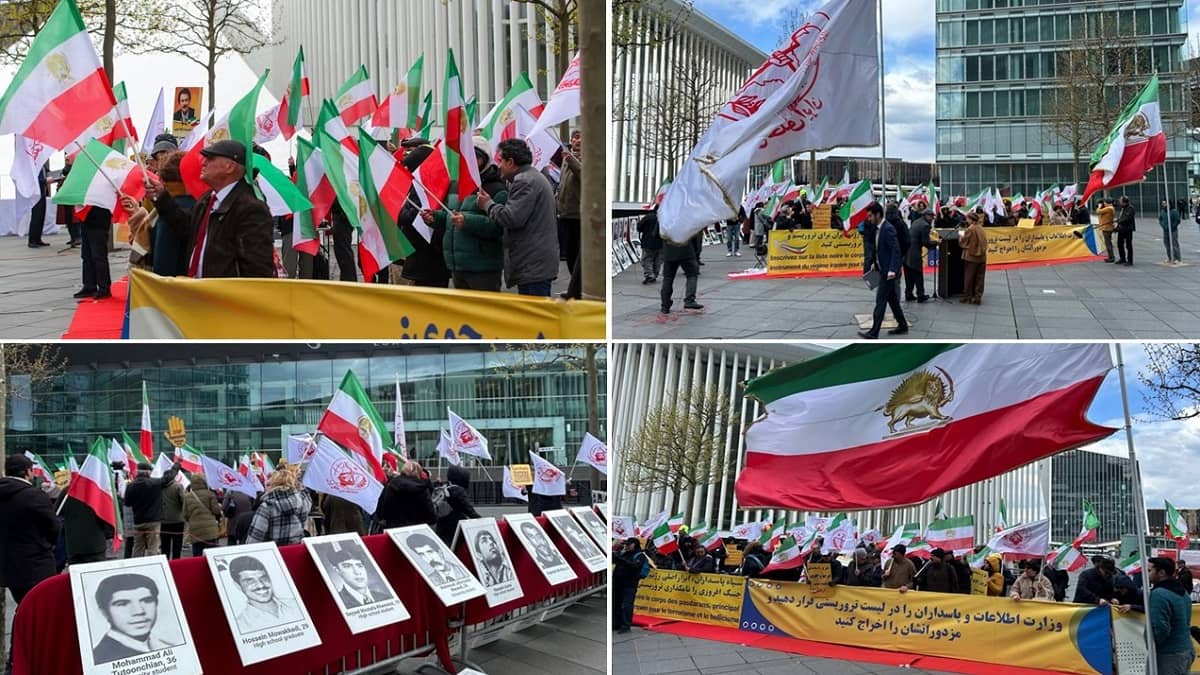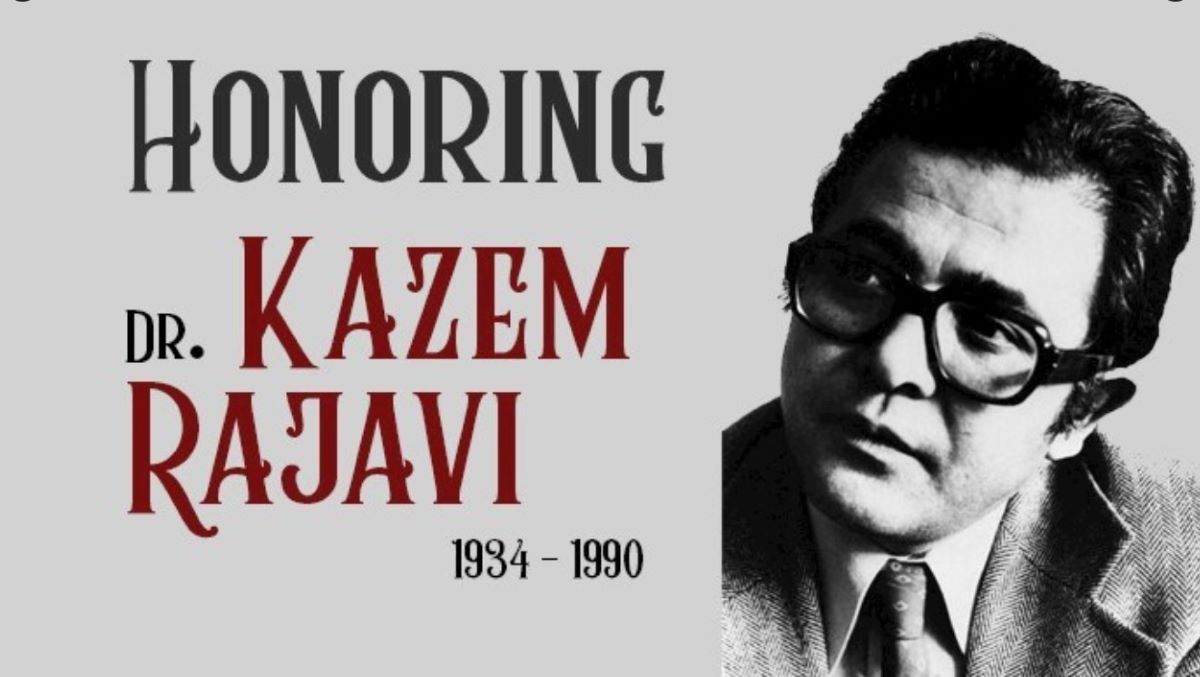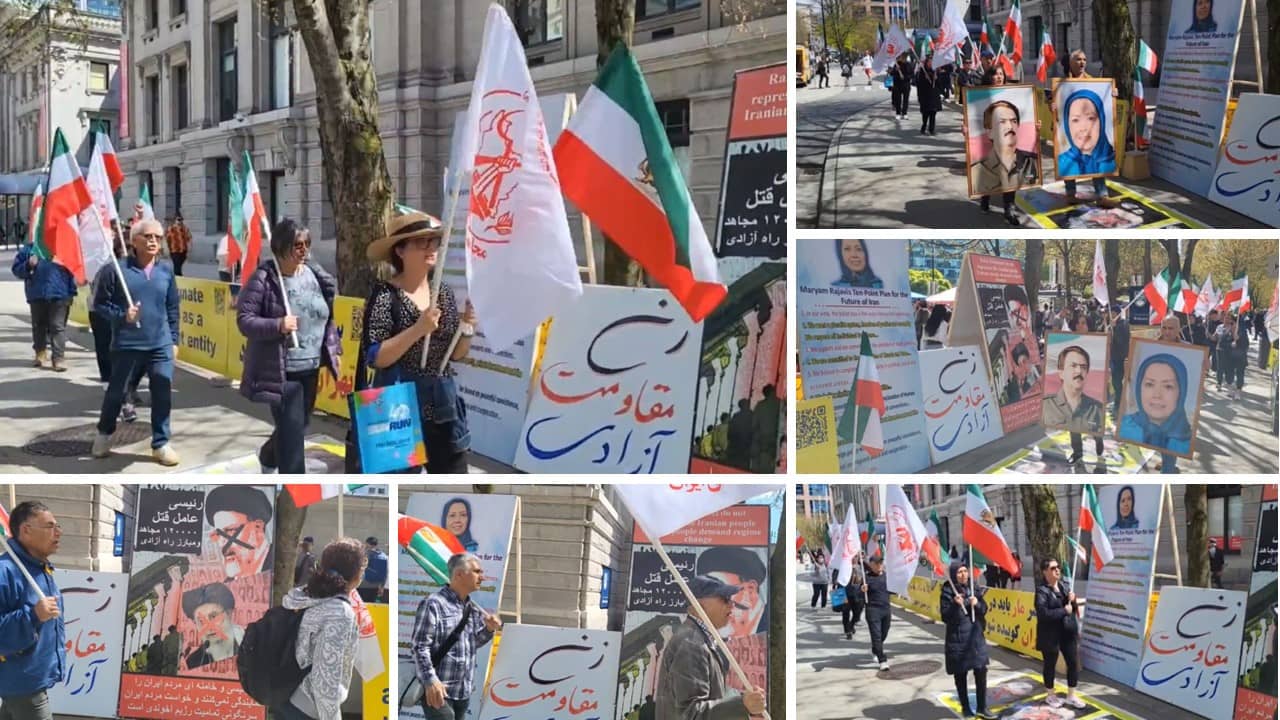The Free Iran World Summit 2021 is the largest-ever online international event dedicated to liberating Iran from its oppressive religious dictatorship and paving the way for a free, democratic, and sovereign future.
Sunday as the second day of the event witnessed international dignitaries and the Iranian resistance supporters attending this largest ever online event from European, Arab countries and Middle East.
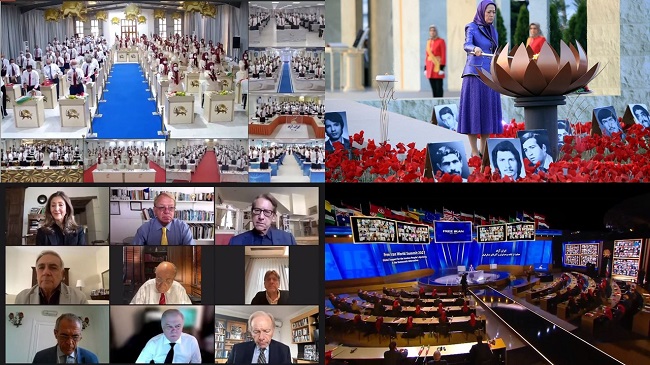
Monday, July 12, 2021, This great event continues for the third day in a row. In the third day of the summit, entitled “Global Support for the Iranian People’s Uprising & the Democratic Alternative“, we witness the international support for the people and the resistance of Iran.
On the third day of the event, the focus is on human rights violations by the mullahs’ regime, the 1988 massacre of 30,000 political prisoners across Iran’s prisons, and the need to prosecute senior regime officials. This includes the Supreme Leader Ali Khamenei, president-select Ebrahim Raisi, and Gholam-Hossein Mohseni-Eje’i, the regime’s new judiciary chief.
This page presents a live report of this event. Its content will be updated throughout the day:
Maryam Rajavi, President-elect of National Council of Resistance of Iran (NCRI)
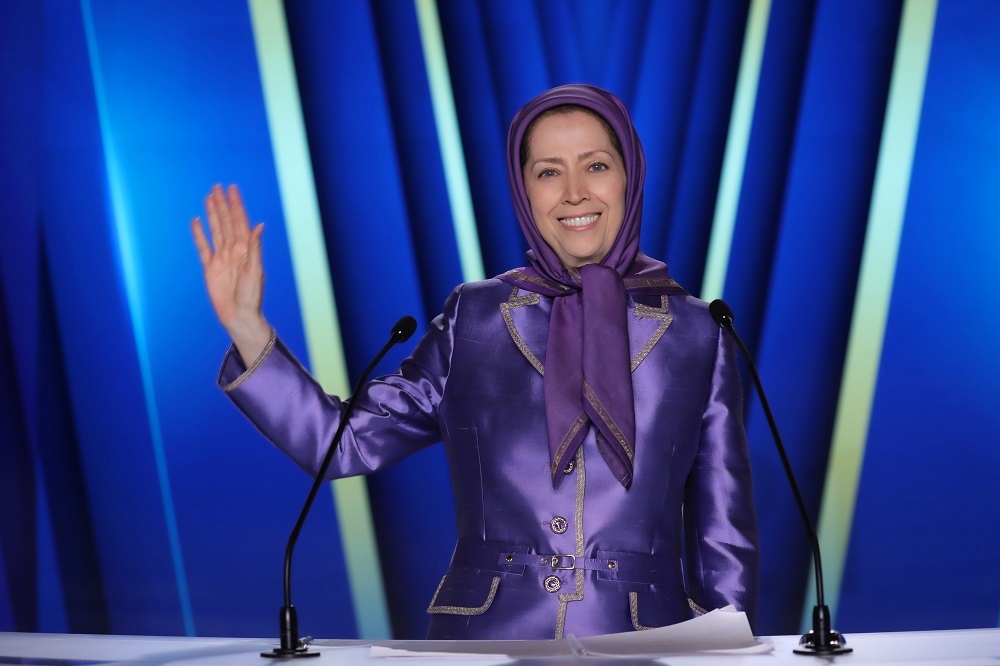
“When it comes to the Iranian people’s relationship with the regime, the appointment of Ebrahim Raisi, the henchman of the 1988 massacre, to the presidency of the mullahs’ religious dictatorship is a reflection of the era of its overthrow,” said Mrs. Maryam Rajavi, the president-elect of the National Council of Resistance of Iran (NCRI), in her address to the conference. “And in political terms, it is the end for illusions of moderation within the regime. It marks the failure of Western governments’ policy of complacency toward the religious fascism.”
“As far as the international community is concerned, this is a test of whether it will engage and deal with this genocidal regime or whether it will stand with the Iranian people.
“We say to the world community, especially to Western governments, that Mullah Raisi is a criminal guilty of genocide and crimes against humanity in 1988.
“He is guilty because as one of the regime’s highest Judiciary officials during the last 40 years, he played a decisive role in the execution and murder of the Iranian people’s children.
“He is guilty because he is one of the leaders of a regime that killed 1,500 youths during the November 2019 uprising, a figure that researchers say is actually three times higher.
“Raisi is guilty because even today he defends all his past crimes and insists on continuing them.
“On behalf of the Iranian people and their Resistance, I emphasize that the United Nations and the international community should recognize the 1988 massacre in Iran as genocide and a crime against humanity.
“I call on the UN Security Council to take action to hold the leaders of the mullahs’ regime, especially Ali Khamenei, Raisi, and Ejeii, accountable for committing genocide and crimes against humanity. The United Nations must not allow Raisi to participate in the next session of the General Assembly. This would be an unforgivable insult to the peoples of all countries who send their representatives to the United Nations.”
Ingrid Betancourt, former Colombian Senator and Presidential Candidate
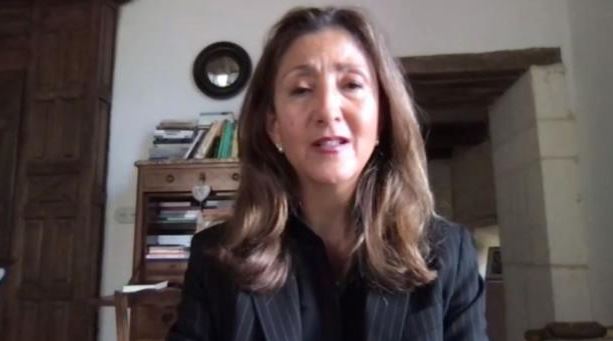
Thank you so much. As I observe you all, especially the attitude for issues to resolve, and I hear your words, I am struck and impressed by the contrast and significance between this woman, a truly exceptional leader, hoisting with courage and determination, the flag of resistance, of democracy, of fair elections, of human rights, of the rule of law, or gender equality.
And this other man, Ebrahim Raisi, the officially designated president of Iran rocketed into power after a sham election, and ridiculed by the lowest turnout on record. An election conducted under extreme repression, in which women, religious minorities and opponents were barred from running for office, an election where citizens were intimidated and journalists arrested to prevent them from informing about this man, the former head of the Iranian judiciary, known also as the butcher, the butcher for his crimes against humanity: the mass murders since 1988 and until today, the enforced disappearance and the tortures. Ebrahim Raisi‘s response to be butchers when asked about his involvement in these killings was that he should be praised for them, and then he was proud of his work.
In contrast, Maryam Rajavi claimed this year another impressive victory against impunity with the condemnation of Iranian diplomat, Asadollah Asadi, for trying to bomb the 2018 annual gathering in Villepinte in Paris, where many of us would have been slaughtered. This is the sheer contrast that we are witnessing. This is the reason we admire the Iranian resistance and this is what moves us year after year to come and join you all and proclaim our resolve to fight the Iranian dictatorship by your side no matter the mask he chooses to wear. Ahmadinejad, Rouhani or Raisi, they are all one and the same.
They are all part of this blood thirsty monster sitting in history with contempt for the values we share, thinking that they will be the long-term winners because they can get away with lies and bravado, outplayers using our divisions, playing with our governments that come and go, and with contradictions of our short term strategies, sometimes wanting to confront them, and sometimes trying to negotiate with them. They have been right about that, to some extent, but not anymore, because they are already defeated, and they know they will prevail. The end is here, and it has a name and face.
The name is the name of every Ashrafian, and the face is the face of you, Maryam Rajavi. It is because of the example of resilience and determination that young people in Iran are daring to defy this homicidal regime, burning images of Khamenei in daylight, chanting death to the tyrants and claiming their right at the risk of their lives. These young girls and boys have never known better. They were born under tyranny and hell have lived all their lives under repression. That was old time normal, but they heard you, and you have awakened them and given them a new horizon. You, Ashrafians are the archive of the nation to source from which new generations can learn about their own past, the memories of your lives are narrating to the Iranian youth how they were dispossessed of the future, how after overthrowing the dictatorship of the shah, the mullahs brought the fight of the elders, and brought Iranians into slavery.
That memory, your individual and collective life is the truth, the truth that makes people free. You are the custodians of that precious truth, that the rulers have tried to erase and rewrite. And they can meddle with the pages of the history books, they can erase the traces of the mass graves that speak of their crimes, they can even force people on the torture to submit to their lives or by paying them, but they will never, never succeed in taming your hearts. For you are the army of resistance, the freedom fighters of Iran. Your scars, your wants, your pain, and your tears are the shield against wickedness.
As I was rereading Khomeini’s decree to execute any case reported in 1988, I was once again shocked by the sheer madness of it all. I hope he writes to his subordinates, that with your revolutionary rage and vengeance, you will achieve the satisfaction of the Almighty God. He calls not to hesitate, nor show any doubt or be concerned with details. He requires from his executive shinners to be most ferocious.
This is the expression of an insane and cruel mind, demanding from his subordinates in the name of God to hate and kill, to be violent, and that, as ferocious animals, ordering to appointed officials to violate their own laws without hesitation, to embrace evil without doubt, and to bear disdain for details, pushing his proxies to dive into the humanizing spiral of terror and sadistic behavior. That is the essence of this regime. To confront dehumanization, you have equipped yourselves with the noblest of all human emotions, with love, and fraternity, with solidarity and compassion, with hope and joy, all of which I have personally witnessed, while staying among you in your camp. You are an army, you wear uniforms, and you live in compounds.
But what keeps you together is not the hatred, the fear, or the rage, the vengeance and the ferociousness but the dignified thirst of justice, and truth and the immense transforming power of the love you share for your country. It is because young Iranians know this, that they are following you. It is because there is the face of a woman that has suffered and doesn’t give up that represents the strength and the good in shear countries, to the evil faces of the mullahs that Iranians are envisioning today, the end of that nightmare. It is because if you Ashrafians that people in all the different regions of Iran are organizing themselves. They want to be ready for the transition to democracy Maryam Rajavi has promised them.
The sacrifices each of you have made, every drop of blood and sweat, every expression of hope and affection, every single effort you have accomplished to survive, has brought fruits, nothing is lost. Every word is blooming. You are the end of the tyranny. Each one of you is the key to freedom.
We are here with you, not thinking that any of us can do anything better or greater or more defining to bringing down the dictatorship than you. But we are here knowing that you are irreplaceable and indispensable for the survival of Iran and his resurgence.
With our admiration and our faith in your triumph, we want to magnify your achievements, honor your heroic choice, and stand by you. Because this is the time to march forward at the face of victors until you win. Thank you, Maryam. Thank you very much.
Robert Torricelli, U.S. Senator (1997-2003)
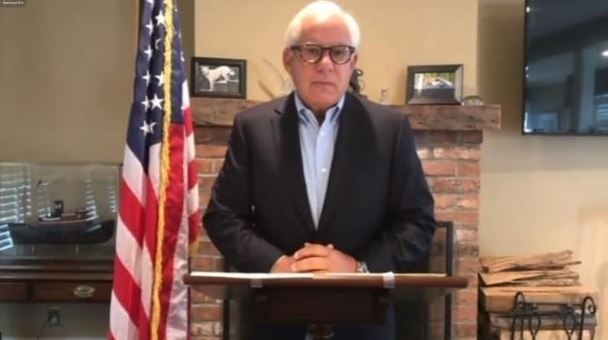
Good day. Thank you for allowing me to give you today. What’s most important is that through pandemics and terrorist attacks, whatever may come, there is no place else on Earth today that I would be willing to stand here with my colleagues around the world in solidarity with Mrs. Rajavi and all those who fight for freedom in Iran. For the residents of Camp Ashraf, whom I’ve had the honor of being with so many times, I think I speak for everyone watching today around the globe, you have our undying admiration.
I believe one day we will gather at a park in Tehran as all of your names are unveiled as a monument to the tenacity of the Iranian people in their fight for freedom. Iranian schoolchildren for a generation will learn of your exports.
And Mrs. Rajavi, it is our honor to stand with you again. Your indefatigable spirit, your courage, the sacrifice, we all recognize that through this 40-year nightmare of the Iranian people, there have been many leaders– some have sought compromise with the regime, some to their credit for from within some silently, some have taken up strong voices around the globe. But in 1988, when the regime waged war on its own people attempting to destroy to murder the MEK, those who saw compromise lost of legitimacy, those who would rule from within the seeking change lost the right tool.
Today, despite what differences there may be in the diaspora and within Iraq. Only one organization, never saw it compromised, has no blood on its hands, never denied the freedom of any Iranian stood tall, and has the means the resources and determination to rule a free and democratic Iran at peace with the world, the MEK and only one leader, Mrs. Rajavi. That is why, across ethnic and racial national lines around the globe, we stand with you today.
To my colleagues around the world, the one thing to witness through these years as we gather annually is the strength of this movement rises like a wave. I am so happy this year, despite our partisan differences in American politics that we’re joined by Secretary Pompeo, joined by former majority leader in the Iowa State Senate, my democratic colleague, Harry Reid, joined this year by Senator Menendez, Senator Cardin.
The regime should not fool itself. We may have our differences on many issues in America, but when it comes to ending this regime and standing with the Iranian people, you cannot get a thin piece of paper between us on our resolve. It builds by the year, one voice, one policy from one country.
The clerical regime in Tehran is the great unfinished business of the 20th century. We witnessed the collapse of the Soviet Union, the end of Saddam Hussein, the destruction of Qadhdhāfī, one by one, they have fall, we’re remained with a clerical regime that deserves not even in a 20th century– its destruction of rights, denials of basic freedom, its lack of the credibility to rule. On this, there should be nothing but resolve by all free nations. We mark our progress this year in that resolve in many ways, knowing that the Arabian people themselves have paid a terrible price for each marker of success.
First, to the great credit of the judicial systems of Europe that those who would have killed us at a rally in Paris the last time we gathered. We apprehended, indicted and convicted, denied their diplomatic status in an attempt by the regime to destroy this movement, all of us, and mostly Mrs. Rajavi. To the great credit of Europe, fact that the courts were unbend, they could not be challenged, they could not be intimidated is an enormous statement by Western Europe. And for that, they have our extraordinary admiration.
Second, the regime breakout of the nuclear reports puts them now as an outlaw nation among the family of nations.
Third, the continued economic deterioration, denying another generation of Iranians the chance to raise their families above poverty.
Finally, the regime has denied any semblance of free choice to the Iranian people in the selection of a new president. It is a milestone in the election of Raisi as President, the Iranian people have taken a stand, not because they voted for him but because the overwhelming majority refused to vote at all. They voted with their feet. Those of you in Iran, who refuse to participate in this sham election, where you were denied a choice of legitimacy for a president, you took the first step, you are now in the movement, you took a stand. Now, the question is, where do you go from here?
The 1988 massacre of members of the MEK by thousands, made Raisi bore than one elected President of Iran. It made him a war criminal. And I know he and his colleagues believe as heads of state, that they are immune from prosecution, that they’ll never answer for the crime. … Milosevic, …. They all thought that as heads of state, they would never answer for a crime. Raisi, you are not a legitimate president. The majority of the Iranian people refuse to participate in this election. They were hurt, and now you will be heard by the international community, when you are brought to justice.
Now the great choice will be in the family of nations, will they take a stand? Hear me clearly. If the United Nations decides that Raisi belongs to the United Nations, then the United Nations does not belong to Europe. We must not host terrorist despots and mass murderers. Take a stand.
Finally, all of you in Iran, who have now crossed that threshold of refusing to participate in this election, join those who have gone to the streets. Everyone can do something: a poster, a word to a neighbor, participation in a demonstration, or refusal to work. Everyone can take a stand for free Iran.
No one asked you to make the sacrifices of Ms. Rajavi or those who are national. Choose your own way to make a stand. And when you do so, know this. All of us around the world, despite our nationalities, our partisan beliefs, our races, our religion, all stand with you. Close down the last unfinished business in the 20th century. End this regime now. Thank you. It’s been my honor to be with you today.
Rudy Giuliani, Mayor of New York City (1994-2001)
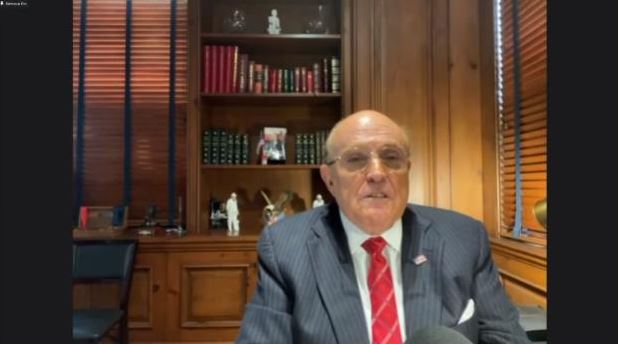
The choice just made by the Ayatollah has in many ways to me better indication of just how fragile this regime is, and just how close this regime is to collapse.
To put in charge of your government a man that is a mass murder… is extraordinarily stupid.
That’s a sign that you really feel that things are moving against you, and you have to become as brutal as possible. The selection of Raisi is exactly that.
I don’t know that the international world really understands how many protests there have been, how far they have gone, how they have permeated the entire country, and they have permeated the social structure of Iran. But the regime understands what all of these protests mean.
You, Madam Rajavi, and your brave and wonderful movement, you are at the core of this.
You are an obsessive compulsion for Ayatollah Khamenei. You are an obsessive compulsion for them, you are an obsessive compulsion for all of the criminals that run Iran. They have proven to us that you are a legitimate alternative. And yet we have so many in the West who close their ears to it.
All Americans are with you in your fight for freedom. We are willing to sacrifice as if we are fighting for our own freedom because we admire you so much, and we know how much you can do for the world.
Matteo Renzi, Prime Minister of Italy (2014-2016)
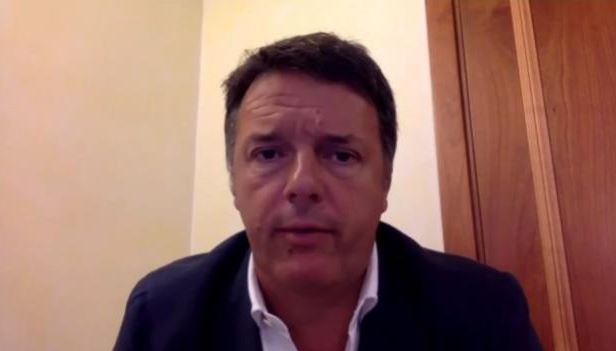
Good afternoon to everyone. I’m Matteo Renzi, the former prime minister of Italy. And I’m so happy to be with you in this particular event. Very emotional, a lot of people in different parts of the world in a time of great troubles and discussion about the future of your country. Your country is not simply a country with tensions, politics, struggles, fights. Your country is first of all a country rich in history.
Let me be very frank with you. I’m the former prime minister of Italy. I know what it means to be a great country with an unbelievable story and unbelievable past and difficulty to use this past to give a future. And that is particularly true for Iran because you are a pillar of our civilization. The history of our countries created the great pages of success, great pages of difficulties, of course, great pages of hope.
Now, we have a terrible moment for a lot of reasons. My opinion is that we live in a world that will change very, very, very strongly in the next few years. Let me be very frank. The new global order will pay in the next few years, totally in discussion. The relationship between the USA and China will be particularly interesting and maybe difficult in the 20s. The relationship between your country, the Middle East, and in general, the EU, and the rest of the world will be particularly interesting, because in that area, we will play a crucial role for the future of humanity.
And at the same time, the innovation from digitalization from globalization from the world of the pandemic will be necessary to write a new page in the history of humanity, but we cannot write a new page without that message. The countries with great history have to be part of writing a new page for the future, only if we recognize what is the priority today. And for that, I think Iran is a crucial point.
I tried with my colleagues, European, to write a new page when I was Prime Minister. I visited Tehran as a member of G7. I tried to discuss, to write the way the people really were involved in the processes of six plus one, the role of European countries, USA, and Iranian regime to finally arrive to an agreement against the nuclear bomb, nuclear bomb against the tensions of the past, and we work very strongly in that direction, but that is my very sad remark. We failed. That is the truth, we failed, because the idea to arrive at a very important point of change in Iran was unfortunately, the year to arrive at this goal was, unfortunately, a failure– and I recognize that now.
And I think we have to admit three very important points. First, without a clear message, our refusal of theocracy, and dictatorship in Iran, without that refusal, it will be impossible to arrive, to write a page of freedom and value of liberty, really. So, the only way for European Union today is to learn from our past and also from our mistakes, because we try really very strongly to achieve a good result of peace, but it is impossible and not our responsibility.
That is the first message I want to give to you. The people who fight for freedom in Iran, really, a lot of European people tried. Also, against European, a lot of you told me, “Matteo, it’s impossible. You cannot arrive at this result.” But we tried and we failed.
Second point. If that is true, we have to accept the idea of the European Union, to refuse that approach and try to give hope for the people who fight against the regime. I think we have a very good message. This is a good time, despite the situation in Iran, in the rest of the world, that is the time to try to use every type of power: soft power, hard power, to permit us to surround the Iranian regime from our desire to change the model.
We cannot accept in 2021, we will continue with an approach against the rights, against freedom, against the possibility for Iran to come back in the global community because it’s clear that message, the people of Iran needs global community. But let me be very frank, my friends, the global community also needs Iran for the values of your country, for the history of your country, for the passion of your country.
Without Iran, the word is the poorest, word that is without a pillar. The past is not important only for the memory, for the book of history, the past is important to build today and perspective for the future. And without the Iranian values, without Iranian history, without Iranian tradition, the word of tomorrow will be weak. So, that is the time to write a change, to write the page of a radical change, and support the people who fight to cancel the theocracy and come back to be in Iran, a part of the new world.
Also, because– and that is the third remark– that is not the time to fight for a nuclear bomb in Iran. That is a time to fight against poverty in Iran, because it’s an acceptable account to reach not only of history but also of assets, as your country was considered responsible for the responsibility of the regime– a country unfit for global investment. We tried, again, to encourage the Global Exchange.
I personally tried in 2015-2016 to encourage companies to make a dialogue between the countries, between their areas, but unfortunately, their regime blocked that, and the real priority today is only one fight to give to your country the possibility to cancel poverty, not to build a bomb, not to build a nuclear program.
So, in my life. I wasn’t a part of a traditional opposition. I tried to make every effort as a pragmatic politician to encourage the dialogue. But I have to admit today, this situation is really difficult and we have to accept that message. If we want to create a new page of hope for that area, we have to cancel theocracy, we have to cancel that approach, and we have to write a page of freedom. Page of real creation of nouvelles.
I conclude with these personal opinions. We live in a world with artificial intelligence, where the internet of things, with digitalization and new personalized medicine. We will live in a world in which the plan will be with the pandemic in the last century, but you do not open with a great repression as the last century, about the great growth.
To arrive with this great growth, we have to invest, of course, in the startups, in the labs, in the new ideas. That is absolutely correct. But exactly for that, we will name them in the next year’s heritage of common values. And that heritage of common values comes from our history. And the word without the tradition of your people will be weak. We have to come back to open the doors of Iran to the global community, and the global community to Iran, but the only way and that is my truth. I tried to make every type of dialogue.
There is not a possibility without a change of regime. And also the situation of today after the votes, after the politics about the votes, after the polemics of the president elected for his role in 1988, after a lot of things you described very well in that event, I think I’m absolutely persuaded there is not a way to give peace, prosperity, and future for Iran if we don’t accept the idea to radical change in the regime.
So, my personal wish is that we will be able to continue this fight. I will be part of that in my role in the European community. But please, consider that. The radical change is not simply an economic or a value on the human necessity for Iran, it’s a necessity for the world. Because the world, without you, is a world more we can, they think that will be a great problem for the Middle East, for the relation with you. And for the relation of the rest of the world. Europe today is a little part of a global discussion between the USA and China.
We have to come back to prayer. But to play a role, I believe the way is exactly that. Come back to have a great vision for the future of the area and not accept our regime with a dangerous approach not only for Iran, but for the rest of the world. Thank you so much.
Fredrik Reinfeldt, Prime Minister of Sweden (2006-2014)
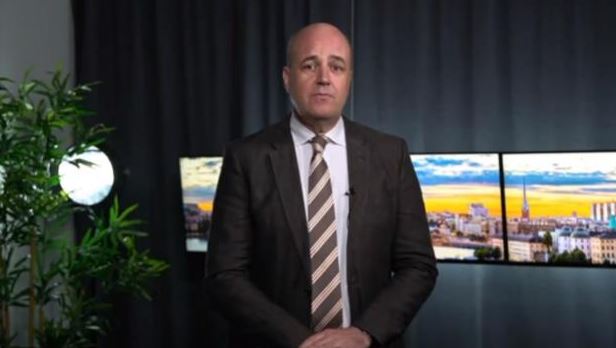
100,000 or more people that originate from Iran are now actually living in Sweden, following very closely what happens in the Middle East and in Iran. I know that this is an example for many of you and remember this is what happens with suppression and dictatorship. People flee, try to find a better life, and it is very often the most entrepreneurial that are trying to get away the first. The ones you really need to create, the best of societies, will instead end up somewhere else. That is the price you pay when you suppress freedom and when you do not tolerate that people are different.
The autocrats, the people with absolute power, are always afraid of their own population. They are always controlling their own people because that is the kind of paranoia that always evolves in this kind of country.
We also see that where there is absolute power, we have seen that they want to show themselves as being more democratic. Therefore, we see efforts to deliver elections as they say because everyone wants to look as if they have the popular support of their people. But don’t believe them. What they do is that they rig elections. We have seen this in Russia, and we have definitely seen it in Iran.
We need to stand up and say there is a better solution and that is of course the search for democracy. Democracy is not just the cast of votes. It has to be fair elections, it has to be open, it has to be allowing everyone to search for public office, and also with the right to bring out their message, and you need to have free and open media.
No one should have absolute power. All over the world we have learned the lesson that all forms of power need to be balanced.
It is so important that you are gathering today because you are hoping for something better, like many people are doing all over the world in reaction to totalitarian rule and authoritarian rulers.
Enda Kenny, Prime Minister of Ireland (2011-2017)
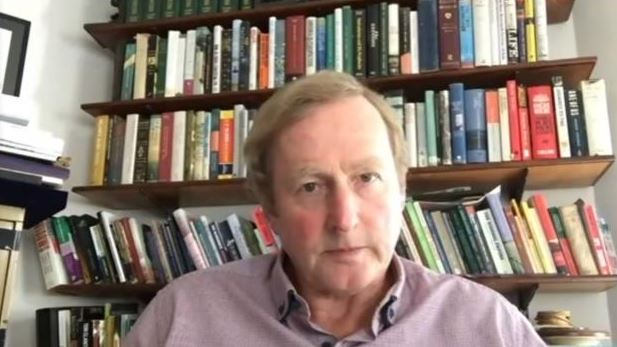
We cannot stand for the 1988 massacre. The United Nations and the European Council must do more.
The governments who deal with Iran must consistently raise the question of human rights, floggings, disappearances, executions, and the denial of the rights that we take for granted.
The United Nations, European Council, the Council of Europe, and every government doing business with Iran must consistently raise the question of human rights and the infringement of those rights by this autocratic government.
Carlo Cottarelli, Director of the International Monetary Fund (2014), Prime Minister of Italy (2018)
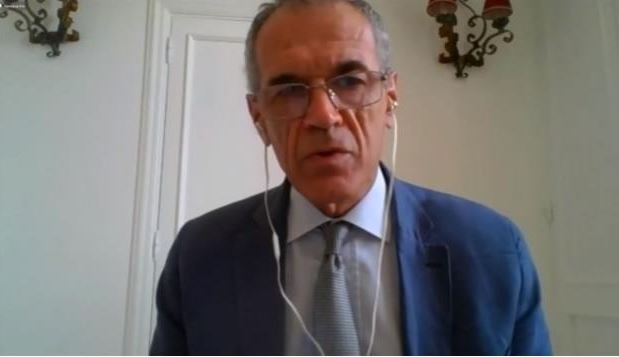
Iran has been at the center of the world’s culture and economic development. It is sad, upsetting, and disturbing to see the Iranian people going through such difficult times over the last decade.
Iran’s poor economic performance points at mistakes in domestic policies, lack of economic reform, and severe shortcomings in the economic governance framework.
Over the last decades in the post-revolution era, the Iranian economy suffered from severe economic mismanagement, which added to the economic consequences of the political mismanagement.
MEP Guy Verhofstadt, former Prime Minister of Belgium (1999-2008)
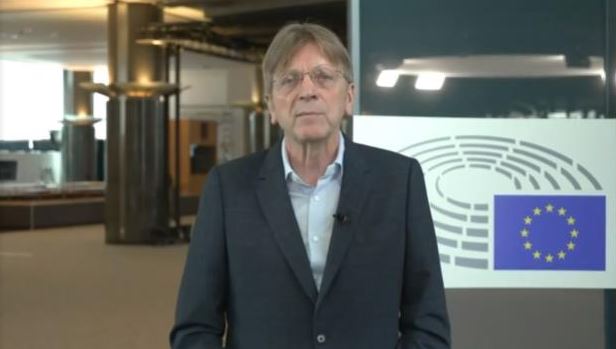
Iran will never become a democracy under the current regime. In the western press we talk a lot about hardliners and moderates, but I think as long as Khamenei holds the ultimate power, that is a hoax.
These elections were a farce and on top of this we cannot be sure that the official results have not been tampered with.
Today I want to also talk to you about the impact the election of Raisi will have for Iran’s relationship with the West.
The nuclear deal will only be possible and can only survive if the new Iranian leadership will allow the International Atomic Energy Agency to do its job and I highly doubt that Raisi will be supportive of nuclear inspections.
We should not expect Iran to open up to the West. Raisi in fact hates our democratic values and let us not forget that he is under U.S. sanctions over a past that includes the extrajudicial killings of thousands of political prisoners.
We will probably see Iran intensify its attempts to control developments in neighboring states. Iran’s missile program and a more powerful Islamic Revolutionary Guards Corps will be dangerous for the security of the region.
Biden will have a hard time convincing the American public and Congress that the deal will be in the interest of the United States.
I believe we should strive to revive the deal but not at any cost. I think it would be a fatal mistake to only focus on the nuclear threat and regard human
We must pursue a dual strategy in which we put human rights higher on the agenda while trying to establish a safer environment in the Middle East.
The EU is still seen as an honest broker and must take its responsibility. So, I urge the High Commission for Foreign Policy, Mr. Borrell, to step up and develop a comprehensive plan to defend basic human rights in Iran and organize collective security in the Persian Gulf. And in this plan, we must put more emphasis on human rights than we have so far.
Petre Roman, Prime Minister of Romania (1989-1991)
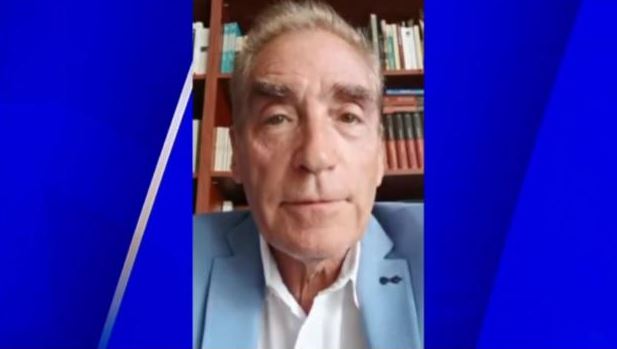
The Iranian people have great hope that there is a solution for a peaceful and prosperous Iran.
The newly elected president of Iran is accused of perpetrating crimes against humanity, and of course, that means the UN investigations has to pursue proper, correct and fair investigations.
The Iranians who are fighting inside the country are fighting for freedom. They are in difficult and sometimes perilous conditions and deserve our highest esteem.
It is time for Iran to be peaceful and prosperous. It is time for Iran to abandon the path of an aggressive or violent attitude with respect to its neighbors.
MEK Resistance Units members from inside Iran
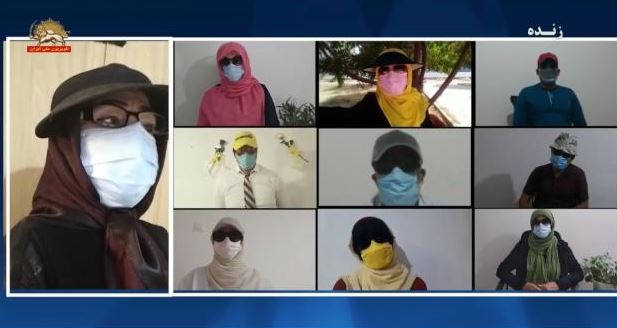
The conference featured live calls from Resistance Units members from inside Iran. These people, who are supporters of the MEK, are joining the conference at great risks to their lives, and they had to cover their faces to avoid being identified by Iranian security forces
“During the past 40 years, the Iranian people have endured great pain and agony and their subject of brutal oppression on the rule of despotic models who have tried to silence our voices… your struggle is for their liberty and equality in a free Iran it has given us hope,” one of the speakers said.
Another, calling from Ahvaz, said, “We are very enthusiastic to visit you in Ahvaz. You are our hope while we are enduring great pain for lack of drinking water because of the despotic regime while we are living near Karun, which is one of the biggest rivers in Iran.”
Calling from Tehran, a resistance unit member said, “I hope this will be the last year we watch you your speech, we are satellite TV. I wish to promise you that next year we will have your speech in freedom square in Tehran.”
Joe Lieberman, Senator from Connecticut (1989 – 2013)
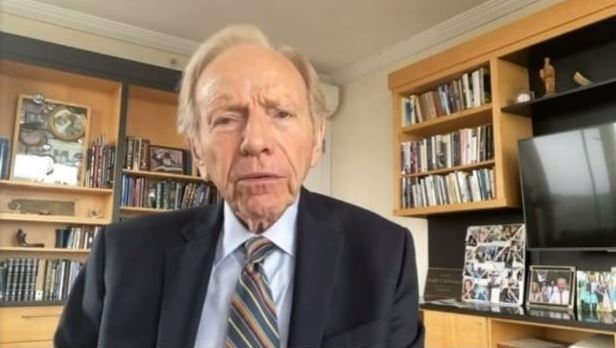
Thank you, dear friends, Mrs. Rajavi, a great leader, dear friend, greetings to you from not just myself, but my wife Adesa, who is your wonderful admirer, and to our friends in Ashraf 3 with whom we have had such meaningful visits. Thank you all very much, most of all, all support to the heroes of the resistance in Iran, and to our dear friends in the Iranian diaspora who support those heroes of their resistance. I am really honored to be asked to join you again today in the sacred cause of freedom, justice, human rights and economic opportunities for the people of Iran. And I am privileged to lead this particular section of this extraordinary program in which my colleagues and I will present and dissect and analyze solutions to the problems, the crisis in Iran that has been described so well over the last two and a half days.
I will tell you my conclusion first, there is only one solution that is left, that will work. And that is regime change in Iran. Everything else has been tried, it is obvious that the regime itself will not change. So, the people of Iran with the support of all of us outside of Iran must change the regime. Every other alternative that would end the regime’s brutal denial of the rights of its citizens, its support of terrorism and aggression in the region, its development of nuclear weapons, and the missiles to deliver them on close and distant nations and enemies, and its hatred stated over and over again of the United States, its Arab neighbors, Israel, and so much of the rest of the world, the only viable course of action left is resistance and revolution.
And I have never been more optimistic, my friends, that the regime in Iran is running at its core and is ready to fall. Iran’s economy is in a dismal shape and the people of Iran suffer because of the economic sanctions that are directed against their corrupt and violent leaders. These are leaders that spend more of their money on themselves and foreign terrorist groups than they do on the people of Iran.
The people have had enough, and like a giant awakening from a nightmare, they have had the courage now to go to the streets and protest and increasing numbers since November 2019. And in their recent elections, by voting with their feet by refused to go to the polls to participate in the election of a mass murderer, Raisi as the next President of Iran. In August of this year, instead of entering the presidential office in Tehran, Ebrahim Raisi should be led to the docket at the International Court in The Hague and charged with crimes against humanity. That is why I am proud to stand with Prime Minister Jansa of Slovenia, who quite correctly yesterday called for an international inquiry into the conduct of Mr. Raisi. In the elections that were held, the turnout out was by far the lowest since the revolution of 1979. Nationwide, by my calculation, about% 40% of the eligible voters voted, and in Tehran, it was about 20% of the eligible voters.
On the Friday before the elections at prayers in the city of Mashhad, a cleric pleaded with the people to vote, “If you do not vote,” he warned, “you are really voting for the MEK.” Well, by that standard, since most Iranians did not vote, he won the elections. And Mrs. Rajavi should be the next president of Iran.
The regime’s constant references and warnings about the MEK reveal its fear of the MEK and the NCRI. And it’s based on the fact that these organizations expose the regime’s worse behavior. Its secret of nuclear weapons program, its violent terrorist actions. The NCRI/MEK is clearly the most organized resistance, operation and organization in Iran. It’s the most competent and capable, and its leader, Mrs. Rajavi has not just been in pursuit of power, she has been in pursuit of power with a vision and values. Look at the 10-point plan Mrs. Rajavi put forward. it embraces the best of universal values of human rights and democratic government. It is shared by people throughout the world, and particularly by people here in the United States. And do not forget that the NCRI/MEK is committed to enabling the people of Iran to choose their leaders in a free election.
Now, for the sake of argument, what alternatives do regime change? Do others advocate for solving the terrible crisis in Iran? First is negotiations. Negotiations. How can world leaders, including America’s leaders rationally negotiate with a regime that has killed thousands of American citizens and citizens of our allies and citizens, of course, of Iran itself? How can we negotiate with a nation that has constantly proven itself incapable of keeping its democratic diplomatic promises? And how can we now possibly negotiate with a nation that has handpicked its next president, a mass murderer, who has regularly declared his hatred of the United States?
My friends, it is simply nonsense to think that we can negotiate with such a regime. We cannot. Others advocate as an alternative to regime change enabling and strengthening the moderates in Iran. What moderates? Where are the moderates? If they exist, they’re in jail and under house arrest. This moderate option has always been a cruel deception perpetrated by the real rulers of Iran, extremists, theocratic Khamenei and murderers and thieves of the IRGC.
The election of Raisi ends the game of Iranian moderation. As the Iranian people in their protests have chanted, “The game is over.” And that is why I believe the reality of Iran today, leaves the people of Iran with only one option for a better life for themselves and their children. And that is regime change. Of course, it will not be easy. Listen to what the American patriot Thomas Paine said at the time of America’s revolution. “Tyranny is not easily conquered. Yet we have this constellation. Well, the harder the conflict, the more glorious the triumph. The American Revolution was a difficult conflict against the great world power. And yet, our victory in that revolution was glorious, as was the victory in the French Revolution, and in the last century, the victory of the Freedom Fighters over Soviet Communist tyranny.”
So, too, well, the victory of the people of Iran, over the tyranny in Tehran be glorious, and transformational. Each of us now who live outside Iran must decide and plan what we will do to support the Iranian resistance as it rises up in a revolution.” I want to speak plainly here in America, we should work to convince the Biden administration, that its own policies and values, which the person has said, are to put human rights and democracy promotion at the heart of our foreign policy, once again, must lead the administration to stop trying to negotiate with the evil government in Tehran, and start supporting the people of Iran who want to overthrow it.
President Biden’s commitment likewise to restore our alliances around the world and work again, with our allies and not with our enemies, should lead him to our allies in the region our our our allies, and Israel who have so much to lose in the negotiations with Iran that are now going on in Vienna, but are not at the table. They deserve to be consulted and given respect, much more respect than the tyrants in Tehran. And in America, President Biden’s lifetime record of bipartisanship, and his campaign commitment last year to bring bipartisanship back to our government in Washington, should convince him not to make any agreement with the regime in Tehran that does not have by partisan support in Congress.
My friends, I think, in Congress, it is now possible to put together a bipartisan resolution endorsing regime change in Iran. I hope it will be introduced and passed soon by the Congress of the United States. In some, the government of Iran is at its weakest point since 1979, and the opportunity for ending it is at its strongest. With the help of God, the courage of the Iranian people and support from all of us around the world, there can and will be a free democratic and non-nuclear republic in Iran soon in our time.
So, I’ll tell you, my friends, what I’ve said before, proudly. Are we ready to give the people of Iran the support they deserve and need? Yes, we are ready. Hazer! Hazer! Hazer! Thank you very much. God bless you all, we will meet soon.
Robert Joseph, former under-secretary of state for arms control and international security
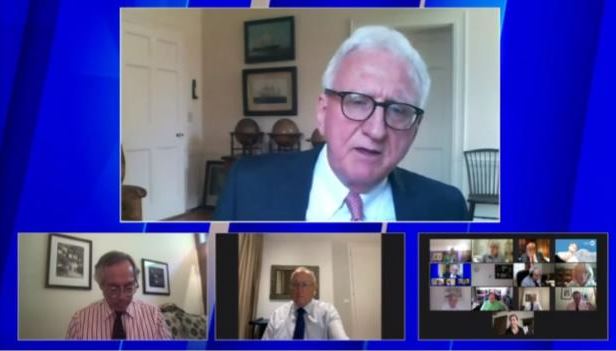
It’s a true honor to be with you and to stand with you in the cause of a free Iran. We are witnessing the end of the religious dictatorship and the beginning of a new era– an era, as Mrs. Rajavi has said, of freedom of democracy and of equality, an era in which all of the people of Iran can fulfill their true potential and restore the prosperity and the humanity that define the great nation.
Two days from now is Bastille Day, celebrated as a day of liberation from tyranny. For those who have sacrificed for a free Iran, your Bastille Day is dawning. Every year, we celebrate your costs, historic struggle, for which the resistance has paid a tremendous price measured in the lives of tens of thousands of martyrs. Their sacrifice will not be in vain. Their sacrifice will always be honored, as it was this morning.
Today, the mullahs’ desperation is palpable. We can see it in the calls across Iran. For an end to the intolerant and corrupt regime, the people of Iran are rising up, they have simply had enough. They have seen their beloved country become a prison to those on the inside and a pariah to those on the outside. And the regime’s response ‘not reform but more repression’ will only accelerate the certainty of its destruction. The selection of Raisi as president is a reflection of the moral bankruptcy of the mullahs.
Raisi is a documented mass murder who as the Prime Minister of Slovenia stated before this conference must be investigated for his role in the 1988 massacre. He must be held accountable for a true crime against humanity.
Raisi’s selection also reflects the weakness of the regime’s leaders, and most of all, their fear of the people’s call for justice. And of all their fears, they fear you the most. They know that you will never give up, they know that you will never give in, they know that the movement led by Mrs. Rajavi provides the democratic alternative and the vehicle for ensuring their demise, leaving them, to quote Ronald Reagan, ‘on the ash heap of history’. We must let the people of Iran determine their own force.
If we do, they will throw off the rope, the yoke of dictatorship and chart a new democratic future. For my country and for others, the first role should be to do no harm. Do not take measures that will extend the life of the regime that will go down in history as one of pure evil.
We must stand for human rights and human dignity, we must be true to our words. We must not repeat the mistakes of 2015 when the regime was handed billions and billions of dollars, which were then used to support terrorist proxies to commit acts of state terrorism to kill hundreds of thousands in Syria and around the region, and to expand the arsenal of missiles and other weapons.
The clear lesson is that there is no prospect for moderation, which always was a false hope of those who favored the nuclear agreement. That hope was and remains nothing more than an illusion. It is self-deluding to believe that a regime that would install Raisi as president could ever reform.
No more resources for the regime. No more feeding the beast. When the people of Iran triumphed over the mullahs, the regime will go quickly, as Ceaușescu did in Romania, and as the mullahs know very well as the Shah did. There is no tension between standing for human rights and seeking a nuclear-free Iran. Let me mention very briefly three lessons drawn from my career in non-proliferation.
First, many years ago, I concluded that as long as the regime exists, it will continue to advance its nuclear program, as it has repeatedly demonstrated. It is a common but false argument that stopping the regime from acquiring a nuclear weapon by rejoining the JCP must be the first priority.
In fact, the resources that would flow to the regime would prolong the regime, it would prolong the repression of the Iranian people, and it would also prolong the nuclear threat itself. Second, the regime has cheated on every agreement it has made.
The NPT, the Safeguards agreement, the additional protocol, and the JCP even before the US withdrawal, as it never came clean on weaponizations and obstructed IAEA inspectors and suspect sites. Applying the role of common sense, who can believe that the regime does not now have a covert program, something if maintained for 40 years? Who would sign yet another agreement with a party that has cheating in its DNA? And third, the regime is only steps away from a nuclear weapon, perhaps measured in weeks, once it decides to do so. This is clear with its enrichment to 60%, with its advanced centrifuges spinning, with the fashioning of Iranian medals, and its continued stonewalling on inspections and on weaponizations.
Far from closing all of the pathways to nuclear weapons, the agreement failed to prevent the mullahs from taking these actions in quick succession, demonstrating that the JCP away was little more than a placebo intended to cure cancer. It was sold as a panacea, but provided only a false sense of complacency.
Rejoining will continue that farce, one made evident by the ludicrous claim that this would only be the first step with other steps to follow to limit Iran’s missile program, its commission of terrorist acts, its regional aggression, and perhaps most delusional of all to address the regime’s domestic repression. As Senator Lieberman said in writing, there is only one solution, and that is regime change.
Of course, we must prevent the mullahs from having nuclear weapons, but we can best do that by applying real pressure and letting the people prevail over the dictatorship.
The NCRI 10-point plan and the organized resistance inside and outside of Iran led by Mrs. Rajavi provide the vision and the means that we see– a free and democratic Iran. Thank you very much.
Michael Mukasey, U.S. Attorney General (2007-2009)
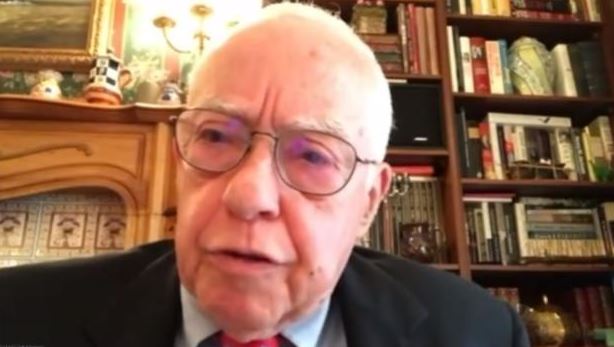
Mrs. Rajavi and other freedom fighters in Ashraf in Iran and outside Iran, thank you for allowing me to participate in this important conference and to help bear witness to the fact that the spirit of resistance is not diminished by the desperate flailing of the mullahs regime and by their attempt to extinguish the flame that you represent.
We’re gathered here in a setting that’s partly virtual because of the coronavirus pandemic. But the issues that Iran faces and that we deal with are not virtual, they’re very real. They’re issues presented by the selection of a mass murder, Ebrahim Raisi, to be the president of the Iranian regime, their issues presented by the exposure in a Belgian courtroom of the plot of the regime to bomb the free Iran rally in 2018 near Paris, and they are issues presented by the need now to support the democratic opposition to install a secular democratic and non-nuclear republican Iran.
You may notice that I said the selection rather than the election of Ebrahim Raisi. That is because the so-called election, as we heard, was, in fact, a hollow exercise, a sham, to make sure that Raisi was picked. And look who they’ve chosen. Ebrahim Raisi was a prominent member of the death commissions that organized the massacre of 30,000 political prisoners in Iran in 1988.
Most of the members of the MEK on direct orders of then Supreme Leader Ayatollah Khomeini. Raisi has not denied his participation in that atrocity. He has, in fact, posted about it. This is not someone that any decent person or government should negotiate with. This is someone who we should insist be put before an international tribunal and made to answer for his deeds. And here I am joined by Prime Minister Johnson of Slovenia, who courageously called for Raisi to be tried and incur the wrath and a criticism of the Iranian regime. That wrath and criticism does not stain the Prime Minister’s record, he should wear it as a badge of honor. Some people suggest that we should not demand that Raisi be tried for his crimes because that will make it difficult for him to negotiate it or impossible for him to negotiate his way out of power.
But Raisi has no intention of negotiating his way out of power. He takes pride in his record, and he claims that he is always, in his words, defending the people’s rights, security, and tranquility. In fact, the only tranquility that Raisi has ever defended is the tranquility of the graves of the 30,000 victims of his property. He does not represent a regime that can change. He represents a regime that must be changed by the Iranian people. If any further proof were needed as to the character of this regime, it’s readily available in the record of the trial of Asadollah Asadi that concluded this year in a Belgian court.
Asadi was an Iranian diplomat, convicted of using his diplomatic cover himself to fly a bomb from Iran to Europe that was to be exploded at a free Iran rally near Villepinte at the end of June of 2018. That bomb was intended to kill Mrs. Rajavi and many of the dignitaries who are participating in this meeting today, who were in attendance at that rally in 2018. It’s impossible to exaggerate the importance of that trial and that verdict. What it proved was that a regime diplomat Asadollah Asadi himself personally carried the bomb from Iran and handed it over to two accomplices, taught them how to use it, and then checked with them to make sure that the plot was proceeding.
The investigation by a joint operation of French, German and Belgian police concluded that this was a state decision, not the personal initiative of any individual participant. The operation was approved by the National Supreme Security Council, headed by then President Rouhani supposedly a moderate. This was state terrorism, not just state sponsored terrorism, but a direct act of the regime to commit a terrorist act outside Iran. This was the first time that an official of the regime was literally caught in the act.
And his only defense was that he should have been the beneficiary of diplomatic immunity, a defense that was soundly rejected by the court that convicted him and his co-defendants and sentenced them to long prison terms. The selection of the mass murderer Raisi aspPresident and the conviction of the regime’s diplomat Asadi who were trying to perpetrate a bombing show that this is not a regime that will behave like a normal government, one that adheres to internationally recognized norms.
The only way to end this regime’s behavior is to end this regime. It’s important now to keep in mind those who rally across Iran to protest the difficult economic conditions that prevail in that country. Do not direct their protests against the United States or against any other country that has imposed sanctions. They direct their protests explicitly to the mullahs. They have said that the enemy is the mullahs, and they lie when they say it is America, and those protesters have also shouted down Khamenei.
There was already a democratic alternative to the corrupt and terrorist regime of the ayatollah. It is the NCRI with its 10-point program for a democratic, secular, non-nuclear republic that guarantees equal rights for all people, men and women.
The NCRI headed by Mrs. Rajavi, who has tirelessly fought to bring those goals about. We’re here to rally support for that alternative and for the efforts of Mrs. Rajavi to end the nightmare that Iranians have been living in since 1979. We’re all ready to help that effort.
Our fondest hope is that those efforts succeed and that we celebrate success in a free and democratic Iran. I can think of no more appropriate way to close these remarks than with the cry of freedom fighters we heard from and of my friend, Joe Lieberman. Hazer! Hazer! Hazer!
Louis Freeh, Director of the FBI (1993-2001)
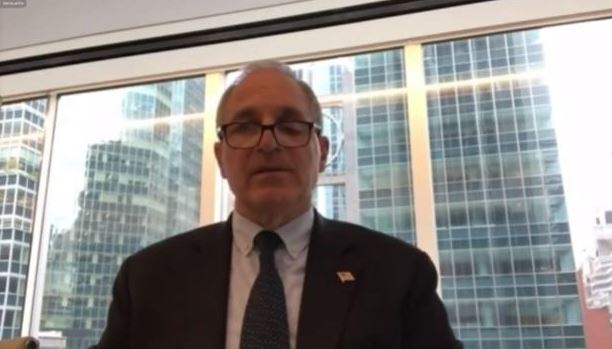
Thank you very much. It’s a great honor to be with you again at a very important meeting at a very critical time in the struggle for freedom and liberty in Iran. Mrs. Rajavi, congratulations to you again, and thanks for your leadership, your courage, and your persistence. And to all of your colleagues who are fighting a fight, which will ultimately result in victory in one which inspires us, not only my American colleagues who join me, but as many, many hundreds of thousands of Americans who support your struggle for freedom.
I want to particularly add the support of Governor Tom Ridge, one of your dearest friends and most ardent supporters who can’t be with us this year, but I know I speak for him when I convey his strong support and his encouragement to continue this fight. I want to echo the remarks of my colleagues, particularly Judge McKay and Senator Lieberman, and address my thanks and also some of my brief remarks to the 1000s and 1000s of brave freedom fighters in Ashraf 3 but also in Iran, who hear these words, and we hope, take confidence and take vision from the support that you have all over the world, not just in this virtual meeting.
A couple of points that I wanted to make. The world has been hobbled in many unprecedented ways by the COVID pandemic. But the results of this awful disease in Iran particularly highlights the ineffectiveness of the regime. But maybe more importantly, for the purposes of our remarks, the disregard that this regime has, not just for human rights, but for the health rights and the living of its own people, the people that it purports to represent, but as we know from the election does not represent them.
We saw reports just the other day of tens of thousands of Iranians going into Armenia to receive vaccinations, a country of 84 million people, where the vaccinations are not only completely dysfunctional in terms of administration, but the Supreme Leader, of course, outlawed any vaccines from the United States or the UK, which is not just putting policy ahead of human life, but putting lunacy ahead of governance and responsibility.
The fifth wave, they’re now in Iran, we’re told by reliable sources, has affected the capital in 143 cities. In the last two weeks, the average daily caseload has risen 62%, with only 2% of the population vaccinated fully. So, Iranians are voting with their feet going to Armenia, a country of 3 million people to get the vaccinations. And this is just a more current example of some of the points that my colleagues have made. The election of Raisi, who is a documented suspect in war crimes, but also crimes against humanity, against the Iranian people.
The accountability, which Madame Rajavi, spoke about before your remarks, has to be addressed at this level. And we also praise the courage, moral courage and political courage of the Slovenian Prime Minister for taking this up. And as you know, we’ve been talking about this for a number of years. The documentation of crimes against humanity by this regime is voluminous and available publicly in many cases on the internet with photographs, with social media, with witnesses. And whether we were talking about the National Socialists at the end of World War II or other criminal regimes, the International Committee particularly it’s legal community, and the responsible heads of states all over the world should portion, I believe, will push very strongly for accountability and for bringing people to justice, who have committed atrocious crimes, not only against their own people but against others.
This regime has been waging a war of terror against its perceived enemies overseas. And just citing the Asadi cases as one more recent example, where the perpetrators were caught red-handed, as we say, in the sentences that were meted out to the poor individuals don’t account for or reflect the complicity of state level sponsorship and planning that went into that attack, which targeted on Rajavi, but also all the freedom fighters and all of its supporters.
The other point I just wanted to mention is, as you know, we recently memorialize the 25th anniversary of the Khobar Towers bombings, the 1996 attack against the United States of America, as well as hundreds and hundreds of Saudis who killed. That wasn’t even just an act of terrorism, it was an act of war against the United States. And our government should keep that in mind as it tries to renegotiate a new, hopefully not the same, pack that we saw in 2015.
But these are, as you know, criminal charges, which are launched in the United States against a whole hierarchy of Iranian participants and put in the IRGC. Beyond the 19 Americans who were killed, as I said, hundreds and hundreds of Saudis were killed and wounded. There’s never been any accountability for that. The United States has a criminal indictment, which is filed, but which needs to be satisfied by warrants, arrests, and the prosecution of the people involved. The same with the regime later. There has to be international accountability.
And the advantage that we have there is looking past the regime. There’s a plethora of credible available evidence, almost like a documentation center in Ashraf 3 and other places in Paris and your headquarters, where this evidence can be mustered and amassed and presented in a fair and credible way, so there can be accountability, not just for the 1988 massacre, but a series of war crimes.
The current president takes pride and his leadership of, not a prosecution, but a pogrom of persecution of thousands and thousands of MEK freedom fighters who were arrested and killed. He says, “I’m proud that in my role as a prosecutor, wherever I was, I have always defended people’s rights, security, and tranquility.” Well, of course, nothing could be further than the truth. And if that’s a defense, it ought to be tested in an International Court of Justice against the evidence and the testimony that will be brought to bear and which is available.
So, to our friends and our heroes, not just in Ashraf, but in Iran today, we have to keep in mind and believe we will keep in mind this perspective, which is a long view, but a critical accountability issue which has to be addressed. And we will have the means and the will to do it. And it will be the final act of justice against the regime that has abandoned any notion of justice. Thank you very much.
John Bolton, U.S. National Security Advisor (2018 -2019)
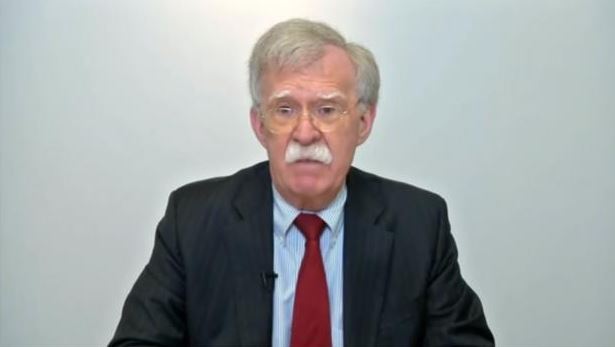
It was evident from the outset that Raisi was the supreme leader’s preferred candidate, and they were going to take whatever steps necessary to make sure he was declared the winner.
I think when you couple that very low turnout with the rising level of protest in 2019 and 2020, again all around Iran, it shows just how fragile the regime support is and how ultimately its survival depends on the Revolutionary Guards.
The elevation of Raisi proves a number of very important points, most importantly, that there is no moderation in the views of the regime or in their objectives around the world.
I think you are going to see a continuation and I fear even an increase in internal repression since the people of Iran, and a continuation and even increase in belligerence internationally, in Iraq, Syria, Lebanon, and Yemen.
The real objectives of the regime in Tehran are not peace and security in the region. It is hegemony.
We have seen in the past couple of years in Europe and elsewhere increasing evidence that it is indeed the government of Iran itself, their diplomats, and their officials who are directing and aiding terrorist activities.
I think the selection of Raisi also proves that making concessions to the regime will not change their behavior. They view concessions by the West as a sign of weakness, and you know historically it is not strength that is provocative when viewed by authoritarian regimes; weakness is provocative. So, the more weakness we show, the more likely the ayatollah will cause trouble.
The efforts of the NCRI over the years to discover the secrets of the regime and its nuclear weapons program, its ballistic missile program, and making those pieces of information public have had a profoundly positive impact on the global debate about the threat posed by the regime.
We can say right now that the United States should not re-enter the JCPOA. It ought to continue efforts to expose the fallacies of that agreement and the dangers that it poses.
The United States should not lift its economic sanctions. They should continue in place and we should aid the people of Iran who are legitimate opponents of the regime who seek nothing more than freedom and the opportunity to pick their own government.
Our declared policy and its declared objective should be to overthrow the regime of the mullahs and replace it with a popularly elected government of the Iranian people.
Marc Ginsberg, U.S. Ambassador to Morocco (1994-1998)
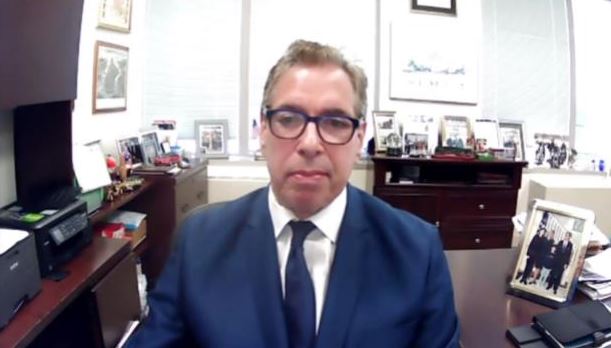
It’s great to be with you, Madame Rajavi. It’s an honor to be with everybody and to take courage and strength from so many distinguished leaders, particularly my friend and mentor, Senator Lieberman. I want to first start by sending my very best wishes on behalf of all of us to those who have suffered through the pandemic and wishing your families the best of health, because we continue to face the challenges throughout the world and throughout, of course, our community.
I also want to say a word of best wishes to my dear friend and our dear friend, Governor Tom Ridge, for speedy recoveries. Tom and I have been joined at the hip in many endeavors, and most importantly, our shared bipartisan commitment to stand firm on behalf of the cause of freedom for the Iranian people. And it’s with that spirit, that unyielding faith and confidence in your leadership in mind that I congratulate you and hundreds of thousands of freedom fighters at Camp Ashraf and around the world for refusing to bow to the terrorist dictatorship of the Iranian failed state.
As John Bolton just said, in order to devise a proper strategy for Iran, the United States has to take into account several myths which its supporters continue to traffic. One of the first myths, of course, is that this regime is allegedly moderate. And I must say that the record of its domestic and foreign policies, its repression at home, it’s the acts of state sponsored terrorism abroad, its accord of the murderous regime, its destructive intervention in Lebanon, as well as in Yemen.
Its support for the terrorist proxies of Hezbollah and Hamas, it’s constantly about Qaeda terrorists, its attacks on commercial ship in the Gulf, I ask anyone is that the policy of moderate leadership in Iran? It’s laughable. It is a destructive myth that continues to be propagated by its apologists around the world and those of us who, shall we say, take the world and look at it objectively, can only despair at those who somehow dismiss this awful record as legitimately giving rise to so-called moderates in this regime. This is not really a record of moderation. It’s a record of an international pariah whose only export is terror.
And what more proof do we need than that of the election of Mr. Raisi, a person condemned by the United States as the Supreme Leader’s chief executioner? The second myth that is propagated is that somehow if we just get back into the Iran nuclear agreement that was negotiated in 2015, then all will be well, that Iran will moderate, that it will change its behavior in the Middle East and around the world.
Before the previous administration withdrew from it, Iran was secretly violating the Iran nuclear deal behind the very backs of the signatories, as well as the International Atomic Energy Agency. It was building a new centrifuge backwards. It was preventing IAEA inspectors from inspecting. It was reenriching uranium and somehow or other bamboozling the international community by suggesting that, “Oh, no, it was abiding by this accord.”
The fact remains, is that all of the signatories to this accord must ask themselves and objectively ask themselves, could they pretend to permit Iran to claim that it’s abiding by an agreement that it had violated from day one? And what did the regime do with the billions of dollars in sanctions relief gained under the nuclear deal that expanded on its people to improve their living standards? No. That it spent its money on new health and education policies for its oppressed people? No. What did they do with that money, with the billions and sanctions relief? Well, it gave it to the IRGC. They gave it to its military, they provided funding to its terrorist operatives, the plan plots against militating against the opposition in Paris, and to the bank account to the Supreme Leader.
The deception that continues to be propagated by Iran, that Iran will do anything and everything to avoid a nuclear weapons development program, is a sham while it inexorably continues its march to develop a nuclear weapon. I know and my dear friends in Biden administration, and I as a Democrat, know that they are not naive about the nature of the regime and they understand the danger to the world of enabling Iran to just merely waltz back into a paper tiger of an Iran agreement without compelling Iran to accept a better, stronger and longer deal. The Iranians have rejected that. The president of Iran, the so-called illegitimate president of Iran has rejected that. So, what I asked is them to negotiate. The ball is in the court of the Iranians, not in the court of the United States.
The third myth is that this regime is too powerful to implode on itself. While true, it will use any act of terror to eradicate its opponents with bombing them in Paris or engage in the grossest violations of human rights. But the proof is really clear.
The majority of Iranians want this dictatorship to crumble, and they’ve placed their lives in the streets of Tehran and throughout the cities of Iran to prove that they are not only willing to put their lives on the line, but they were refusing to accept the ayatollahs edict that they vote in this last election, which was a sham election. There are democratic alternatives who enjoy the popular support of millions of Iranians suffering, surely represented both at home and abroad by Madame Rajavi, the MEK, and NCRI. And we know that this military dictatorship is determined to eradicate this movement and to find a way to prevent Madame Rajavi from achieving the democratic ideals that all Iranian aspire to under her leadership.
Based on the principles of human rights, freedom and democracy, the testament to the popular support that Madame Rajavi enjoys, as well as the MEK is reflected in the incessant effort by the regime and apologists to discredit this popular democratic opposition. Let’s save it by those with a hidden agenda to serve as enablers of this regime. But the Iranian people will never achieve freedom, that these myths are not irrefutably rejected.
I want to close by conveying my best wishes to everyone in attendance. Thank you for the honor of always being with you. And to let you know, Madame Rajavi, that even those of us who fight on the Democratic side of the … will fight and continue to fight for the people of Iran, for your leadership, and for the success of the MEK. Thank you very much.
Garry Kasparov, World Chess Champion, Pro-democratic political activist
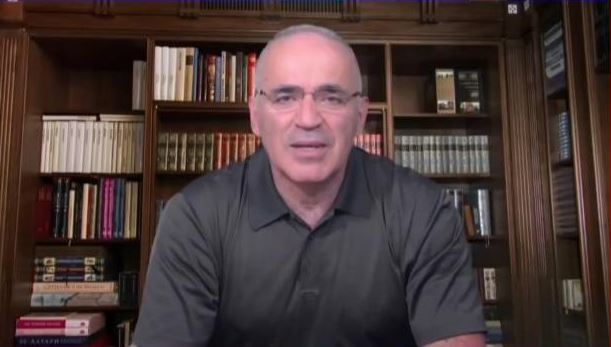
I’m honored to address the Free Iran World Summit today. My sympathies are with the people of Iran living in the regime today, and with Iranians, everyone living with dark memories of oppression and mourning. For all the foreign interference, terror, and war caused by the illegitimate Iranian regime, it is vital to remember that no one suffers more than the citizens of that regime.
I say illegitimate because every dictatorship is illegitimate. It has no authority from the people. Instead, it oppresses and tortures. Iran is not a government. Iran is its people. And like all people, they deserve to determine their own lives. What happens in Iran, to those who wish to do this, became clear in 1988. 30,000 political prisoners were murdered in Iran that year. Thirty-three years later and there has been no justice for the victims and their families. And no accountability for Ayatollah Khomeini’s order or for those who carry them out.
A long list that includes the new president of Iran, Ebrahim Raisi, of course, he was not really elected. The word election is a sham in Iran, just like in Russian. He was chosen to play a role. And that’s such a Moses finger was selected. As a message from the regime, the Iranian, and the world, we have committed terrible atrocities in the past. And we will not hesitate to commit war.
How can the free world, the world of democracies that supposedly value human life, negotiate with a regime of Northerners? How can the leaders of Congress like the United States, which often talks about the importance of human rights, sit across the table from Raisi, whose role in the 1988 massacre was well-established? Of course, they should not. Not at the same table, not in the same room. Dictators do not change because of diplomacy or negotiations. They did not liberalize from engagement or deals or kindness. They only understand power. So, their power must be reduced. Terror regimes should be isolated, and their leaders treated like criminals that they are. That is how you can support the people and the victims of these regimes.
Instead, the United States is repeating a terrible mistake by negotiating with Iran’s leaders in Vienna. These negotiations are a waste of time for everyone except Iran’s brutal rulers, who benefit from these elevated status. They’re also buying time to pursue the world’s most dangerous weapons. The United States is once again pretending that Supreme Leader Khamenei is interested in acting in good faith in this negotiation. In reality, the only thing he cares about is staying in power.
It is a tragedy that we must steal talk of freedom as a goal that must be fought for. One that is the fundamental right of everyone, everywhere. Iranian’s deserve the freedom to determine their destiny, to live without fear. So are as the Russians, Chinese, and the billions of people living under dictatorships around the world. They deserve freedom. Just as much as any American or German or Japanese.
These goals cannot be reached by giving brutal regimes what they want. Dictatorships do not turn into democracies on their own. International community must bring maximum pressure on the Iranian regime, isolate its leaders, and to support those fighting for democracy and human rights in Iran.
To do anything less is to forget the crimes of the past, to ignore the crimes of the present, and to enable the crimes of the future. Thank you again for inviting me. All my best wishes to the participants of the Free Iran World Summit and every Iranian wishing to live in peace and free.
Ms. Matin Karim
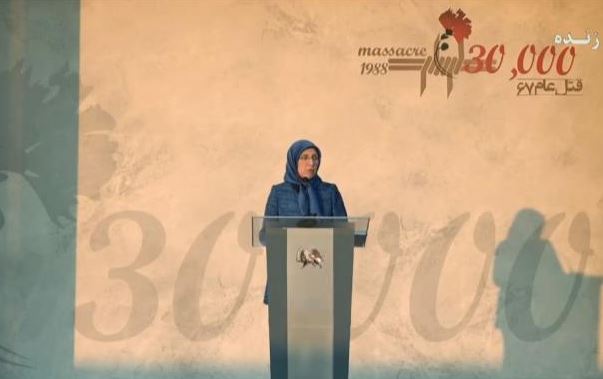
Several former political prisoners addressed the conference and gave harrowing accounts of what happened in Iran’s prisons during the 1988 massacre, and the role of regime president Ebrahim Raisi.
Ms. Matin Karim spoke about the brutal tortures in the regime’s prisons that she witnessed when she was only 15 years old. She had first-hand experience of Raisi’s treatment of political prisoners, including torture, fake executions, and other pressure.
Mr. Majed Karim
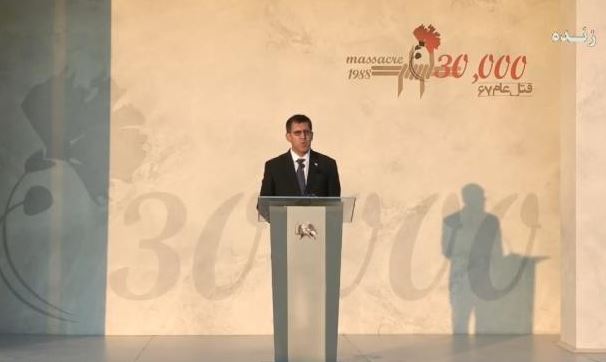
Mr. Majed Karim, who also spent several years in Iran’s prisons, spoke about Raisi’s roles in Karaj prison. Raisi was on a mission to eradicate MEK members and supporters, Karim said. Raisi was especially harsh against students who supported the MEK and insulted their families. Some of his friends were executed under Raisi’s orders. Others were killed under torture under Raisi’s watch.
Mr. Mohamad Farmani
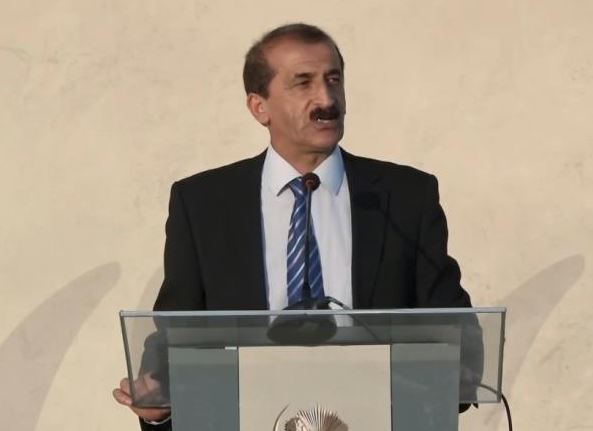
Mr. Mohammad Farmani, who was arrested in June 1981, described his experience. Raisi, as the prosecutor in the city of Karaj at the time, played a key role in the arrest, suppression, issuing fake charges, and executing prisoners. Farmani personally witnessed several executions.
Mr. Saleh Kohandel
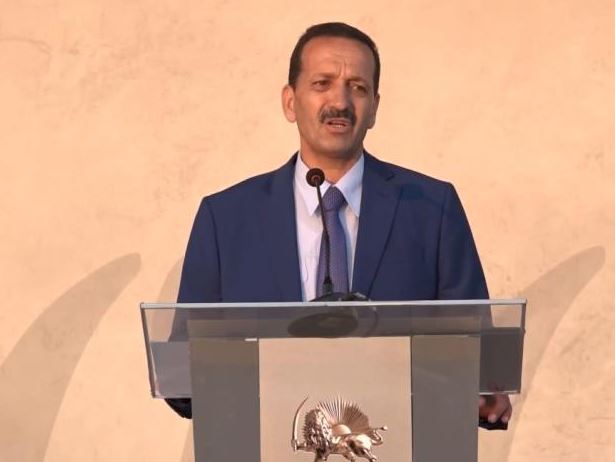
Also speaking at the event was Mr. Saleh Kohandel, who spent 12 years of his life in prison on charges of supporting the PMOI. He has known several political prisoners who were executed by the Iranian regime. In his remarks, Kohandel spoke about the pressure the regime imposed on political prisoners, including depriving them of medical care and subjecting them to physical torture. He also spoke about the high spirits of the political prisoners, how they defied the pressure imposed by the regime, how they helped ordinary prisoners and informed them about the crimes of the regime.
John Baird, Canadian Minister of Foreign Affairs (2011-2015)
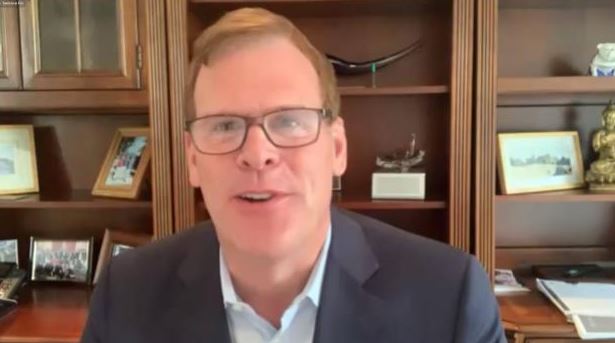
I want to say to you very clearly the people of Iran that the Canadian people are with you in your great struggle. One of the proudest moments that I had in public life over 20 years in government was the day when Canada made a big decision. Ten years ago, we said that we wanted nothing to do with the terrorists supporting, human rights violating regime in Tehran.
Western leaders must understand the charade and myth of reform, and that appeasement is possible in Iran is simply a mirage. It has failed for more than 40 years.
I want to join you in calling for accountability for this regime’s human rights violations, mass murders, repression, and for its support of terrorism not just in the region but frankly around the world.
I have a message for Ebrahim Raisi: you are not a legitimate leader, and you are not a legitimately elected president. The Iranian people will hold you to account for your actions and the world will hold you accountable for the blood on your hands.
Tony Clement, Canadian Minister of Industry (2008-2011) /Minister of Health (2006-2008)
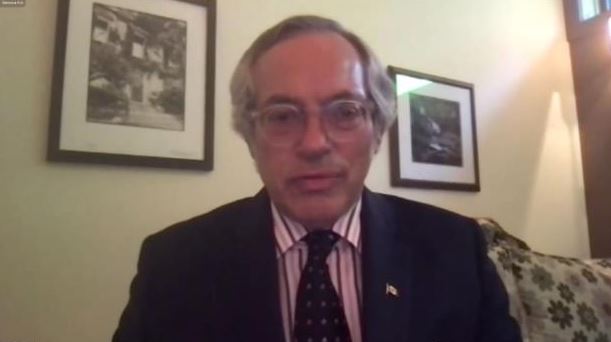
Thank you very much for the opportunity, Madame Rajavi and distinguished guests, and I can say to fellow delegates, it is such an honor to address this gathering, which due to the pandemic, and I’m familiar with pandemics as the former Minister of Health, unfortunately, we must be held remotely with the use of this technology.
Still, while we’re not together physically, we are together with a common purpose and a common mind. We are all aware of the trials and tribulations suffered by the Iranian people as a direct result of the Iranian murderous regime. This is a decade’s long tragedy now, and the recent national elections or so-called elections illustrate no softening of the regime’s authoritarian activities, both at home and around the world.
Despite the sometimes-conciliatory words used by the regime’s mouthpieces, there can be no doubt of their evil intent. Who suffers? Innocents do– Iranians and non-Iranians who get in the way. But this forum illustrates there can be hope, and there can be justice.
As a former senior Canadian government minister in the Stephen Harper government, I’m proud of our record of holding the Iranian regime to account. This culminated in the expulsion of Iranian diplomats and spies in 2012.
A formal breaking of diplomatic relations due to Iran’s material support to the Assad regime during the Syrian civil war, the noncompliance with the United Nations resolutions regarding its nuclear program, continuing threats to the State of Israel, and fears for the safety of Canadian diplomats in Tehran.
In addition, Canada formally listed the Iranian regime as a state sponsor of terrorism under the justice for victims of terrorism act. Unfortunately, the response of the Iranian regime was to harden their stance versus Canada, and indeed elsewhere. Their state sponsorship of terrorism is well-known. Less well-known is perhaps the harassment of and threats to the Iranian diaspora, including Iranian Canadians.
I have personally heard accounts of this harassment designed to quell critical voices and replace them with mouthpieces for the regime spouting the established narrative. Suffice to say that even without agents running this out of the functioning embassy, this is still a major problem in Canada and around the world. Meanwhile, Canada, through its parliament and its diplomats, continues to demand accountability.
The downing of Ukraine International Airlines Flight 752 by the Iranian military, with so many people aboard with connection to Canada, further illustrates how important it is to hold the Iranian authorities to account. I was pleased as a parliamentarian at that time to participate in the recognition in 2013 of the 1988 massacre of 30,000 political prisoners by the Iranian state as a crime against humanity.
And since that time, parliamentarians, including myself, have raised this issue. We must never forget about past atrocities simply because new atrocities have been committed. They all show a continuing and unabated course of conduct by the Iranian government, really, since the revolution itself.
Now, since the theme here is of accountability. I know some apologists will say of any Canadian you talk of accountability, yet in Canada right now, new horrible revelations about mistreatment of indigenous children in residential schools has been revealed.
Canada does not come to this debate with clean hands. With this argument, I would argue and answer the following: that like most countries, Canada does indeed have troubling and unacceptable acts that have taken place in the past. But here is the difference.
In Canada, we do not hide away from uncomfortable truths. We confront them, we acknowledge them, and we try to move past them in a spirit of reconciliation. This is not to say that it does not produce anger, far from it.
But we have a democratic society with a process by which these issues are resolved. Where is such a process in Iran? Where is the means by which families who’ve lost loved ones to state sponsored violence can receive accountability? Where does the Iranian regime share information, come to terms with its wrongs, and seek justice for the survivors? The short answer is this is not a trade of the Iranian regime, nor will it ever be so long as this along is this government is in control.
And that is the uncomfortable truth. That is why all of your work is so important: a voice of justice, seeking truth, and accountability. While it may seem at times that your work is futile, I firmly believe that the arc of history bends toward freedom, justice, and prosperity. And this will once again find the people of Iran.
Canada will no doubt do its part in this aspiration. I look forward to the day when these conferences are unnecessary and a part of the past because justice is with Iran in the present. Thank you.
Judy Sgro, Member of Parliament and Canadian Minister of Citizenship and Immigration (2003-2005)
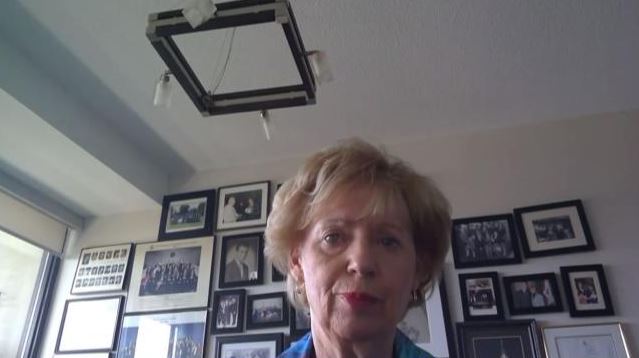
I’m delighted to speak to you today in this very timely conference. I am sure that all of you have already heard about Iran’s sham elections and coming to power of Ebrahim Raisi that has drawn international condemnation for his crimes against humanity over the past 40 years with news headlines calling him the butcher and a mass murder.
Amnesty International said that Ebrahim Raisi has risen to the presidency instead of being investigated for the crimes against humanity, of murder, enforced disappearance and torture is a grim reminder that impunity reigned supreme in Iran. My good colleague, as well Professor Irwin Cotler, on many occasions has referred to a culture of impunity, reining in communities in Iran and no wonder the Rao Wallander Center for Human Rights in a report published in 2019 named Raisi and a dozen Iranian officials to be sanctioned for gross human rights violations.
In short, I want to commend and echo the call of the UN Special Rapporteur on the situation of human rights in Iran, that the massacre of political prisoners in Iran in 1988 and Raisi’s role must be investigated by an international delegation. Since in addition to a crime against humanity, it may account to actual genocide.
But what strikes me most in this sham election was the overwhelming boycott by various strata of the Iranian society, who hundreds and thousands of online messages said that their vote is to overthrow this tyrannical regime. We, in Canada, of course, had our share of grief from the atrocities of the clearfork regime that, among others, includes the downing of flight 752 buy IRGC missiles, killing 176 people on board, including dozens of Canadians.
But allow me to speak in a more positive tone. I had the pleasure of speaking at these rallies in person in Paris and many other ones online. I believe the resilience and commitment of Ashraf 3 residents for free and democratic Iran during these unimaginably difficult times when they were constantly attacked by the Iranian regime militias and rockets. It finally paid off. Indeed, what they showed to the world and to the people of Iran was that by standing by the principles of Madame Rajavi‘s 10-point plan, sooner or later, responsible actors will have to come and join the rally if they want to avoid the cycle of violence and warmongering. I want to reassure you that we take your plates and your call for change very seriously and wholeheartedly stand by you in your quest for having what we take for granted, of course in Canada, is fundamental human rights.
I am a firm believer that Mrs. Rajavi’s 10-point plan put together for Iran is both practical and very much achievable. Like many resistance units inside Iran who have declared their readiness for change, I am also declaring that I’m ready for this most welcome and avoidable chain.
Wayne Easter, Canadian MP, Member of the Joint Interparliamentary Council, Minister of Agriculture & Agri-Food (2004–2006)
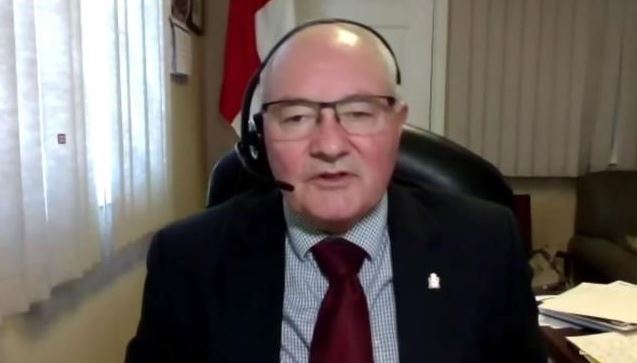
It is long past time for real justice and accountability in Iran. Canada’s long called on Iranian authorities to uphold and respect democratic and human rights, including the right to freedom and expression. Canada has also experienced that lack of accountability by Iran for the victims of Flight PS752.
Iran’s leadership will go far in terms of its abuse of authority in its denial of human rights and international law.
Mimi Kodheli, Minister of Defense of Albania (2013–2017)
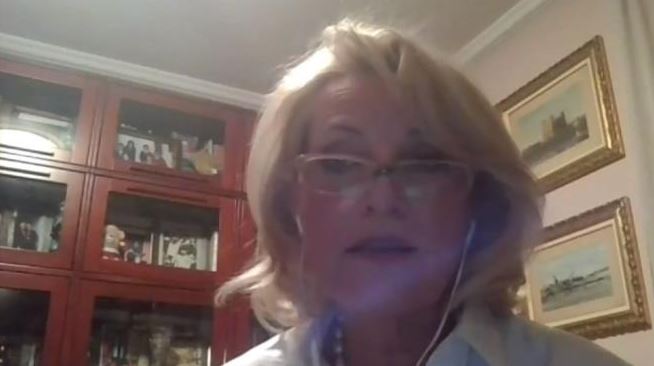
Hello everybody. Dear Maryam, dear ladies and gentlemen, dear friends, allow me to start by congratulating the organizers of this important and special event, to express support for the Iranian people’s desire for a democratic, secular, prosperous, and non-nuclear Republic of Iran, and to condemn violations of human rights and state-sponsored terrorism.
From the beginning, I would like to align with the bipartisan resolution 118, sponsored by the majority members of the US Congress, announced on April 27 of this year. On the other side, Albania fully aligns with the EU NATO Council of Europe and IAEA positions on the issues of democracy, human rights, international and nuclear security related to Iran.
Well, Albania firmly believes and remains committed to the safeguard and promotion of the democratic principles and values. It has always been standing by them who seek and fight for tolerance, democracy and human rights, which for us, represents the foundation of peace, but also the foundation of our unconditional support in the fight against terrorism, and all forms of fundamentalism.
As you know, from 2013, Albania has been hosting a number of Iranian dissidents. At that time, I used to be minister of defense of my country, talking about their presence in our country of being a prime minister, Rama clarified to reporters in Vienna, where he has to speak before the OSC permanent Council, in his capacity as head of the organization, that this is a topic and an issue and that it’s not new to us in relations to Iran.
We have taken an action that hundreds Albanian in line with the Albanian tradition, in the walk of a non-negotiable strategic alliance with the United States to welcome or open the doors to a group of people whose life is at risk, or used to be at risk at that time. And it is written in the agreements that we have made in Albania as a result of humanitarian, not political operation.
We’re very proud to have helped these people like we helped the Jews during World War II with no interest in a heightened agenda, but offering shelter when many others turned their backs on them. This is how we see it always. On the other hand, the Albanian government and all the Albanian political spectrum has expressed dismay, over the Iranian hostage and malicious stance and activities towards and within the territory of Albania. For two decades, Albania remains firm in its commitment alongside NATO, US, and other partner countries in the fight against international terrorism and any acts of that endangers world stability and peace.
In several cases, the Albanian authorities have identified dangerous activities organized by members linked with an Iranian terrorist groups. So, in December 2019, Iran’s ambassador to Albania and one of the embassy diplomats were expelled from our country. Foreign Ministry reports at the time that the two Iranian diplomats were declared unwanted after being suspected of being involved in activities that threaten the security of our country. So, the decision to declare random diplomats undesirable from the Ministry and Foreign Affairs. We further clarified like a decision that has been taken in consultation with the allied countries because their activity in Albania was violating their diplomatic status and not only.
Ladies and gentlemen, in January 2020, the government of Albania expelled these two other Iranian diplomats also planning terrorist attacks against MEK. Well, what more to say? I think that we in Albania have always been a shining example of tolerance, and religious coexistence, where people respect each other as equals, regardless of faith and cultural background.
We do have more than three main religions in our country, and we know how to live all together and to survive as Albanian, we know how to do so. We strongly believe that strengthening and promoting these values is a concrete effort to protect our society and to preserve our social cohesion. But also to clarify, the difference between radicalism and extremism, which has nothing to do with religion.
So, to counterterrorist and extremist ideas, their philosophy, their political project, and defeat them, we must fight the roots of extremism: the poverty, the social injustice, and they impose ignorance and intolerance, and of course, the exclusion and the discrimination that’s happening in Iran.
I think that furthermore, Albania’s election, for the first time as temporary member of the United Nations, Security Council commits us to defend human rights and the international rights as a country whose history has taught more than once that human rights and international rights are the inevitable pillars of the platform, that builds better societies and human rights protection without any discrimination, definitely also promotes stronger cooperation among nations. So, let’s give peace another chance. Thank you for your time.
Ad Melkert, Special Representative of the UN Secretary General in Iraq (2009–2011)
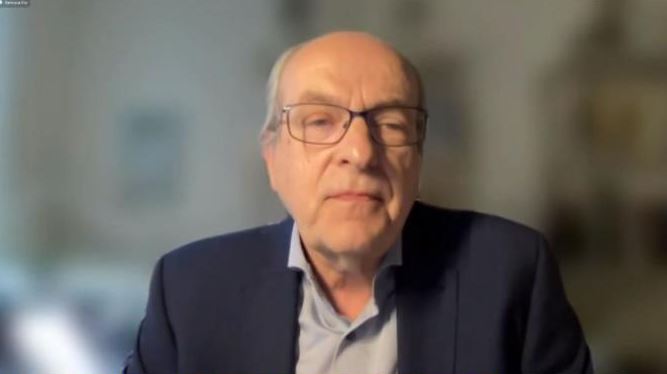
Friends, thank you very much once again for having the opportunity to share this platform, this very important platform with you.
More than 40 years have passed since the first call for justice after the mass killings in Iran in 1988. Last September, seven special UN rapporteurs addressed the Iranian regime in a letter which was according to UN procedures made public after the addressee failed to respond. In that letter, the experts stated, We note that as early as 1989, the UN Special Representative on Iran observed that the information emanating from various sources confirmed that politically motivated mass executions took place in the second quarter of 1988.
We further note that in 2017, the Special Rapporteur on the situation of human rights in Iran recognized that overwhelming evidence shows that thousands of persons were summarily killed and called for a thorough and independent investigation into these events. We are extremely concerned that no such investigation has been conducted to date.”
Let us know the facts. That’s the respective responsibilities of the rapporteur pertained to enforced or involuntary disappearances, extrajudicial summary or arbitrary executions, rights to freedom of peaceful assembly and association, the promotion and protection of human rights and fundamental freedoms while countering terrorism, torture and other cruel, inhuman or degrading treatment or punishment, promotion of truth, justice, reparation, and guarantees of non-recurrence.
And to sum it all up, the situation of human rights in the Islamic Republic of Iran. With more than 40 years passed and the indignation and impatience of the international community growing, I co-signed an open letter to the UN High Commissioner for Human Rights, seeking a commission of inquiry into the crimes that took place in Iran in 1988. It has become even more primitive now that international humanitarian law will prevail, and consequences will be drawn, as in just a few weeks from now, Iran’s presidency will change.
I would like to echo the statement by Amnesty International Secretary General, Ebrahim Raisi has risen to the presidency instead of being investigated for the crimes against humanity of murder, and forced disappearance and torture is a grim reminder that impunity reigns supreme in Iran. In 2018, our organization Amnesty documented how Ebrahim Raisi has been a member of the Death Commission, as it was called, which forcibly disappeared and extrajudicially executed in secret thousands of political dissidents, intervene and go after prisons in Tehran in 1988.
Under his watch, as had in the Iranian judiciary, the judiciary has also granted blanket impunity to government officials and security forces responsible for unlawfully killing hundreds of men, women and children, and subjecting thousands of protesters to mass arrests in at least hundreds to enforce disappearance and torture and other ill-treatment during and in the aftermath of the nationwide protests of November 2019. ……….
Timo Juhani Soini, Foreign Minister of Finland (2015–2019) & Deputy Prime Minister (2015-2017)
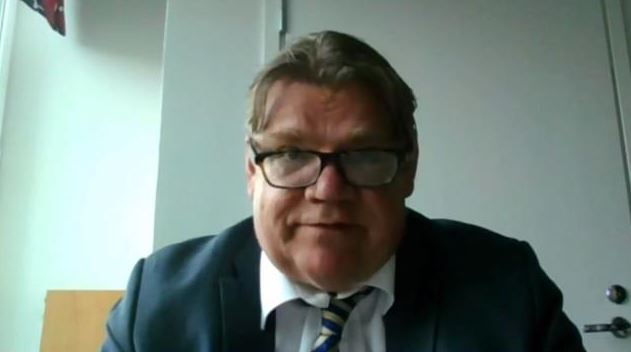
The system of Iran doesn’t give people a chance for a democratic society. But the country has all the basic elements for success.
Human rights violations have not only continued but they have increased after Raisi was nominated as judiciary chief in November 2019.
Iranians really have the capability to cry for freedom and it is getting louder every day, and no president can stop or silence it.
Dictators are clinging to each other. They fear all kinds of revolutions. Every ideology, religion, belief, or value becomes secondary and irrelevant, and the number one goal remains to stay in power.
They keep Assad in power in Syria, they have mutual interests and serve the same kind of mentality and in order to avoid official direct involvement in the crisis they support proxy groups in different parts of the Middle East.
When it comes to the West the United States and Europe must adopt a common unified policy. You must have a justifiable long-term policy to follow systematically. 600 million Europeans need a calm and harmonious voice. Human rights must be protected and promoted both home and abroad.
The Iranian people need friends and supporters, but the key ingredient for sustainable change can only stem from the Iranians themselves.
Audronius Ažubalis, Foreign Minister of Lithuania (2010-2012)
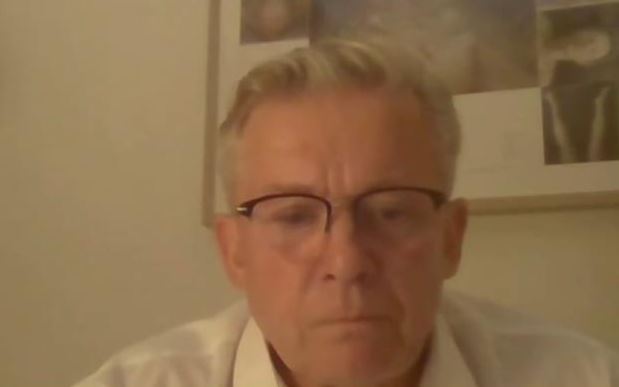
Good evening, everybody, esteemed colleagues, Iranian freedom fighters, especially those who are speaking from Iran. I know it needs a lot of courage, and it’s a huge risk. A lot has been said today about the situation in Iran, and I don’t want to repeat about a person who has been appointed as a president and who was involved in a very serious crime against humanity.
I want to talk about some, let’s say, attitudes towards the events in Iran in Europe. Today, we hear talks about the possibility that the United States sanctions are removed as a part of revival of nuclear code. And it’s warmly supported by some EU member states, such as France, and Germany. We can’t just imagine how tempting it would be for the mullahs’ regime to use oil revenues to fund his economic and military goals and to strengthen the internal pressure apparatus. But even in this difficult situation, at home, it should be clear that Raisi is not prepared to compromise on nuclear talks. And in his first interview, with media, has made it clear that it is the west who should make all the side concessions.
Nevertheless, the question remains, even if he did take a step to compromise on issues, like nuclear ballistic missiles, destabilizing activities and variation, the question remains– should Europe turn its back to its democratic human rights principles and a whole dialogue with a man who is a criminal against humanity? I’m sure that no. The EU has not sanctioned any Iranian for human rights violations since 2013. But when the deal on Iran’s nuclear program was reached, despite major abuses, such as those detailed in the United Nations report released this March, the EU has several times condemned the death around for human rights violations, including execution by hanging of dissidents, such as journalist Ruhollah Zam last December.
Just in April 2021, after eight years of silence, the European Parliament voted to impose sanctions on Iran in the framework of a new global human rights sanctions regime, so called the Magnitsky act, established by the Council of Ministers in December. The council then decided to extend its restrictive measures responding to serious human rights violations in Iran until 14th April 2022, adding eight persons and free entities to the sanctions list in view of a role in the violent response to the November 2019 demonstrations in Iran. This modest list now comprises a total of 89 individuals and four entities. They are colleagues.
We cannot forget with whom we are dealing. Iran is after China, the country that persecutes the opposition by using capital execution, where they execute sportsmen, journalists, and even miners in large numbers. The case of Swedish Iranian national Ahmad Reza Jalali is just one more example of the regime’s brutality.
The EU Parliament last Wednesday passed the resolution demanding Jalali’s immediate release, also urging the sanctions being imposed on Iranian regime officials for imprisonment and executions of EU nationals. I’m personally glad that the EU parliament called on the European Council, I’m quoting, “To consider further targeted sanctions, including freezing the assets of the Iranian regime officials and entities involved in the arbitrary detention and sentencing to death of EU nationals, including in the event of Ahmad Reza Jalali’s continued detention, either using the current EU human rights sanctions regime against Iran or a US global human rights sanctions regime.” This is very important, but it’s not enough, as the resolution against the Iranian regime’s human rights violation, unfortunately, is not binding.
In the end, I just want to express my sincere support to the Slovenian Prime Minister Jansa, later supported by Senator Lieberman. We have to push for President Raisi to be investigated by International Court of Justice for crimes against humanity, including murder, forced disappearance, and torture.
One might say that we as Europeans have no other choice, but to talk with him, as we have no other internal … in Iran, but actually there’s someone to whom we can talk. If we stand on the side of Iranian people who have boycotted the recent presidential elections, and do not want Raisi as their president, then we will see that Iran has a democratic alternative, the National Council of Resistance of Iran. Let us stand with them and the people of Iran, and let us force this theocratic dictatorship to understand that Europe will not turn a blind eye to the crimes committed by this regime, and particularly by Raisi.
One might say that we as Lithuanians are far away from Iran, and could not understand Iranian people’s wishes. Believe me, we do, because Lithuania just 30 years ago returned back its freedom from communist dictatorship, from oppressions, from the tortures, from deportees. And we know what it means to live in bondage.
Once again, I wish Iranian people all the best. And please know Lithuania will always stand with you in the same way as we now stand with the democratic declaration opposition, as we stand today with the Russian democratic opposition. Thank you for your kind attention.
Eduard Kukan, Foreign Minister of Slovakia (1998-2006) , MEP (2009-2019)
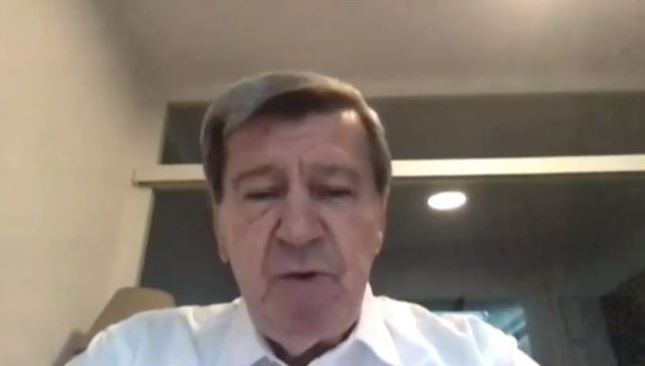
Dear friends, I’m very happy to be able to join you in this magnificent international summit for three Iran. I have been many years in politics in my own country Slovakia when I was Minister of Foreign Affairs for 10 years, and later in the European Parliament in Brussels, where I also was deputy for 10 years.
My acquaintance and friendship with the representatives of the opposition PMOI representatives in Brussels is something I’m really proud of. I’m very well aware of their commitment and fight for the freedom in Iran. I participated in many meetings for the friends of Iran, and I have met your leader, Madame Maryam Rajavi four times. And from my own experience, I know that there are many European politicians who are supporting Madame Rajavi in the movement she reigns.
Now we are having this online summit after the election, so-called elections in Iran. And the so-called elections brought a new president to Iran, Ebrahim Raisi. But we know that he was the personal peak of the Supreme Leader, Ayatollah Ali Khamenei, to become president. So now we are facing Iran with the president Ebrahim Raisi. It means that the game is no more deceiving of the public, no more fooling of the international community.
The European Union has to face this new situation in a strong way. We cannot close our eyes over the violations which this theocratic regime in Iran does: its repression of women and it’s crushing the opposition. The situation cannot go back to normal as long as the Iranian regime is doing this. And it should be clear for the European Union for the European Union High Representative for the Foreign Policy, Mr. Joseph Morrell, that it’s not possible to behave in a normal way as long as the situation in Iran prevails.
I think that there is a situation in Iran that calls for a new uprising. I think that the people of Iran have enough. They deserve much, much better than they had for the over 40 years of this regime.
So let me finish by saying that I urge all Iranians to support Madame Rajavi for this fight. And we, the Europeans, it is our duty to support this movement in Iran to bring the democratic normal life for the population of Iran. So I wish you all the best in that fight. Thank you.
Anna Cinzia Bonfrisco, Member of the European Parliament for Central Italy
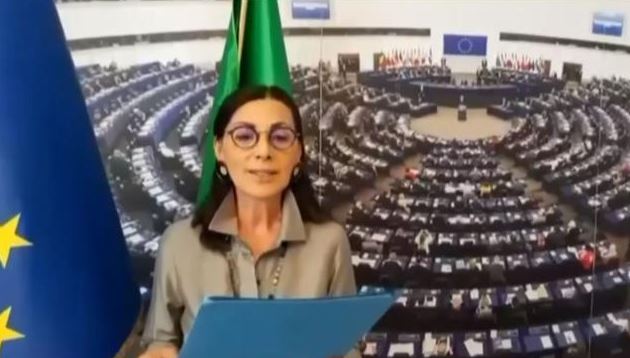
We stand with the Iranian people for their deserved of liberty and call for prosecution of Raisi for the many murders he has carried out in Iran. We remain steadfast towards Maryam Rajavi’s 10 Point Plan and democracy.
Alexandr Vondra, Minister of Defence of the Czech Republic (2010-2012), Deputy Prime Minister (2007-2009), Minister of Foreign Affairs (2006-2007), MEP
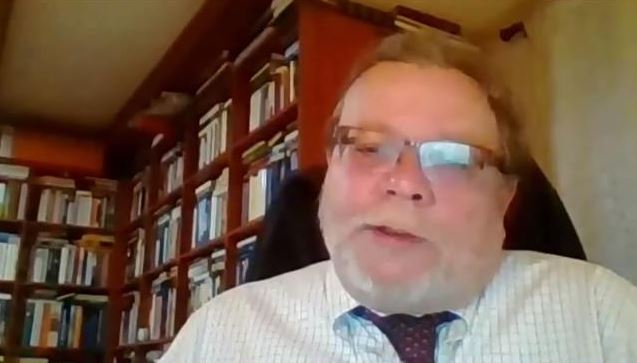
Iran is a theocratic dictatorship and a major threat to peace in the region, as well as the entire world. The current Iranian regime has its roots in its medieval nature. It finds it necessary to export its fundamentalist ideology for its survival and under the banner of religion.
Now that Khamenei is extremely weak and frightening by a society that is like a powder keg, he has no other choice than to bring up Ebrahim Raisi.
In the West we must finally change our policy. The EU has spent too much time trying to appease Iran and its regime. We clearly see that this policy had not brought any positive results. The JCPOA agreement serves just the regime to find a hidden route to build its bomb.
We should have no illusion about the regime’s true nature and this regime must not be our partner. It is an enemy and I would do my best in the European Parliament to stress this point.
We must offer our support to the democratic alternative of Iran. The National Council of Resistance of Iran is led by a woman, Mrs. Maryam Rajavi, and she has a plan for the future of Iran.
Ryszard Kalisz, Minister of the Interior of Poland (2004–2005)
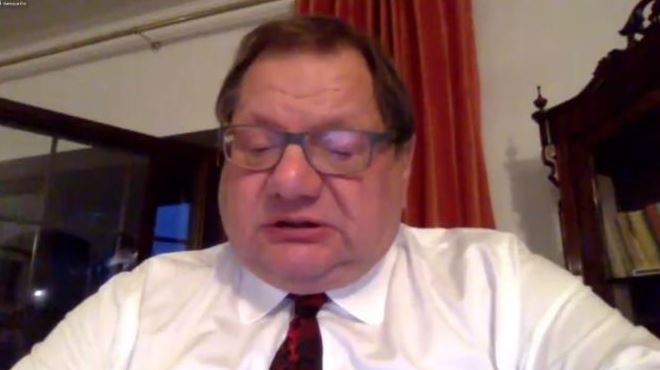
In the past few decades, the religious dictatorship has destroyed Iran and brought war and terrorism to the Middle East.
It is time for the international community to stand in solidarity with the Iranian people who are calling for freedom and democracy in order to rebuild their country and live in prosperity.
The international community and especially European Union cannot remain silent in the face of such outrageous treatment of human rights defenders in Iran.
I would like to draw attention to the very bad economic situation in Iran in connection with the action of Iranian authorities. Iran’s economic situation is dramatic, and we all know how negative actions of authorities influence the society. Iran must be a democracy.
Lord Henry Bellingham, Under Secretary of State at the Foreign and Commonwealth Office (2010-2012)
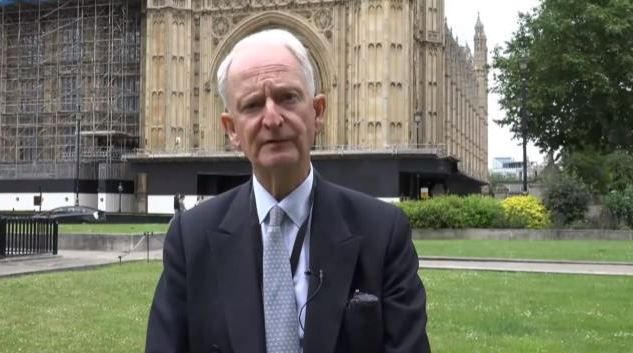
Your Excellency, Mrs. Maryam Rajavi, it’s a huge honor to be able to contribute to this conference today. And I’d like to congratulate you, Your Excellency, on what you’ve done for the Iranian people. You have been an inspiration to Iranian people in Iran, the Iranian people in exile, and indeed, to all freedom loving peoples throughout the whole world. And I really must reinforce the point that you have a huge amount of support within the United Kingdom, within our parliament.
I was a member of parliament for over 30 years. I was first elected in 1983, a whole generation ago, in fact, shortly after Bashar was deposed. And I’ve been following the troubles of your country as an MP. I’m now a member of the upper house as a member of the House of Lords. And I plan to carry on giving you my absolute full support.
And this conference is so important because it’s over 42 years, you’ve been standing firm– standing firm, for your beliefs for your principles, standing firm, for the people, because you believe in people having a right to vote, and the right to have their say, and what can be more important than adherence to the rule of law, and the reintroduction of democracy.
Because whatever we might think about governments, some governments we may love, other governments we may detest, if they’re legitimately elected, then it’s the people who only have themselves to blame. And the government has to be accountable. And the tragedy of your country is that since the deposing of the Shah, you’ve had hopes of freedom at different times, you had false hopes, false dawns.
But what we’ve seen most recently is hugely depressing. And I really do despair of the recent election of Ebrahim Raisi, say, election, it’s actually not an election, it was a sham election, it’s the installation of someone who’s got the most appalling human rights record. And I just say to you, and your supporters, your friends, that you’ve got a very large number of people in our parliament in the UK, in different Parliament’s across Europe, in America, and the whole of the free world. You’ve got people who are absolutely right behind you, Your Excellency. We want you to succeed. We want your movement to succeed.
We want democracy. We actually want your people to have a say in how the country is run. And we want Iran to be restored to the family of nations. Yes, Iran, of course, is a member of the UN. Iran has different relations with nearly all countries, and we have those relations, we are carrying on that contract, that full contact with the Iranian government, because we actually feel we should not desert the Iranian people. But please don’t in any way interpret that as support for the regime, which includes all the free loving, democracy loving parliamentarians in our parliament in this country. We despise that because we know that the government has no legitimacy.
So my message to you is very simple. After all, these years of fighting for democracy, for freedom, please, please persevere, don’t give up. You got support in so many places. And I think that in our lifetime, we will see a change of government in your country, we will see a government coming to power that actually has the support and the endorsement of a people, so your country really can then join the whole family of free nations under, hopefully, presidency or premiership in the future. So, we wish you well. Our heart goes out to you and your team and your supporters, and I’m absolutely convinced that you will prevail in the end. Thank you.
Gilbert Mitterrand, President of the French Human Rights organization Foundation France Libertes
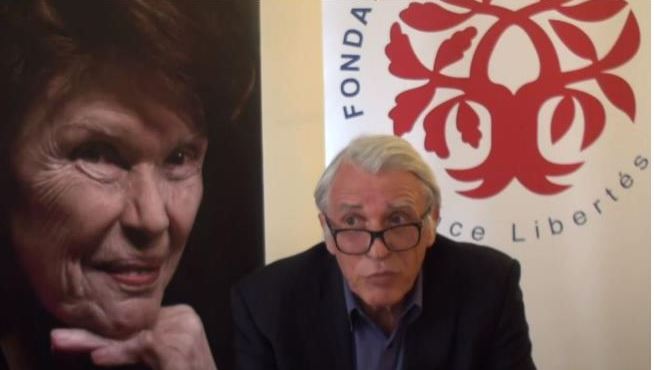
The election of Raisi reveals the true tragic nature of the Iranian regime. It is a true insult to the memory of the 1988 massacre victims and an insult to their families.
This election is also an admission of the regime that is in place only through terror. It is also a challenge to international diplomacy and France in particular. It is a challenge that shows the Iranian regime who will always stand against human rights.
We need to spell out our request or demands. The alternative is necessary and is always possible. It is possible because democracy is born from the people, not the regime. Raisi’s presidency is proof that this regime won’t be democratic.
A path for democratic Iran exists. It is symbolized in the ten-point plan.
Silence at this moment, with Raisi as the regime’s president, is unacceptable. It is time for the international community to realize and demand change in Iran. How can international institutions remain silent? I am proud to speak out for the liberty of Iran.
Tritan Shehu, Albanian MP, Minister of Foreign Affairs (1996-1997)
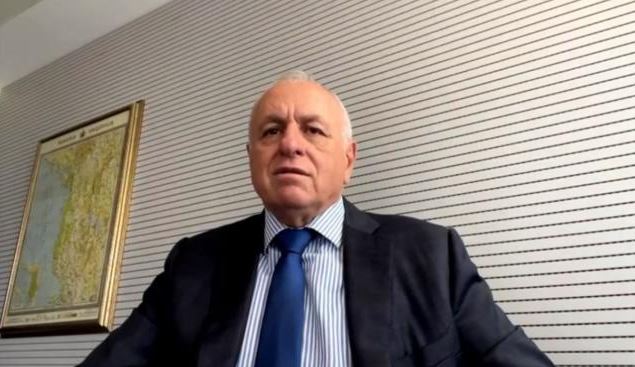
Dear Mrs. Rajavi, distinguished guests, dear Iran and France, and all over the world. It’s my pleasure to take part in this very important summit for democracy and freedom, attended by so many international personalities and thousands of Iranian.
Freedom and democracy is a fundamental, a universal right, and the people of Iran deserve it. They deserve human rights, justice, and the states of law. Freedom means also deity worgen health, freedom means peace, integration with the other people to be open to all without any prejudice, discrimination, regardless of race, gender, religion, the geographic position, etc.
Iranians need to enjoy themselves. They suffer from the misuse of religion, from oppression of the people, poverty, corruption of the government, and many more. So, I fully understand why they want democracy because democracy is fundamental for development, for stability, for the country, and also for the so complicated Middle East region.
So, it is necessary to avoid extremism, the fundamentalist mentality, organization, institutions, and state. Fundamentalism is not only in the form of democracy, but the more create a basis for radicalism and terrorism, at the moment in which we need to create the condition for a peaceful cohabitation between the peoples for the prosperity.
Only democracy can be the guarantee for these and this only one model of democracy there is over freedom, equality, human rights, diversity, free votes for all.
This is why I give you my solidarity and stand with you on the right side of history in your cause for democracy and equality. I wish you the best and a successful summit. Thank you.
Corinne Lepage, French Minister of the Environment (1995-1997)
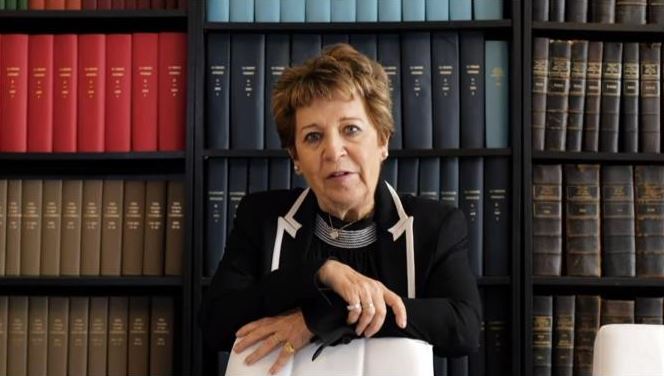
I wish to support your journey to bless your people with the power to choose, the freedom to choose leaders, destiny, job, religion, partners, etc. I see in Iran that activists and freedom fighters are persecuted.
The presidency of Raisi only makes the situation worse. We must be alarmed by this situation and the crimes committed by this person.
I would like to say to the Iranian people that I am beside you and wish that western states are more courageous when they talk about Iran.
We want to share values that need to be defended. Authoritarian regimes that deny rights cannot be supported.
Lucinda Creighton, Irish Minister of State for European Affairs (2011-2013)
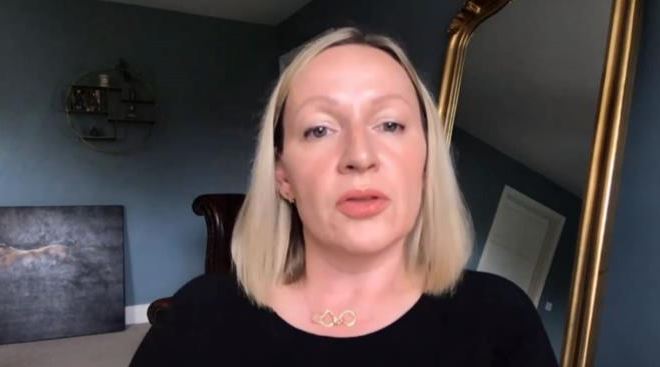
The Islamic Republic of Iran poses a serious threat to the Middle East and the international community in general through its nuclear program and its financial and logistical support for various terrorist groups.
For me the undemocratic process and the election result are a clear sign that the ruling elite in Iran is primarily interested in perpetuating its own power which happens at the expense of the Iranian population.
The economy is weakened and more and more people in Iran are expressing their dissatisfaction with the theocratic regime that is in place.
The turnout of the Iranian population in the most recent election, which was below 50%, a historic low, shows that the public is losing faith. The result shows a profound alienation between the leadership and large parts of the population.
Of course, free and fair elections have never existed since the foundation of the Islamic Republic, but the recent election saw a gross abuse of the system as Raisi was designated as the next president.
He is simply an old figure of the regime and more than this he has been intimately involved in the regime’s brutal practices over the years. He was instrumental in the officially denied mass executions of the regime’s opponents.
Raisi’s selection represents a further obstacle to the normalization of relations with Iran. His elevation will exacerbate domestic and regional problems that Iran is involved in one way or another throughout the Middle East.
Rama Yade, Secretary of Human Rights of France (2007-2009)
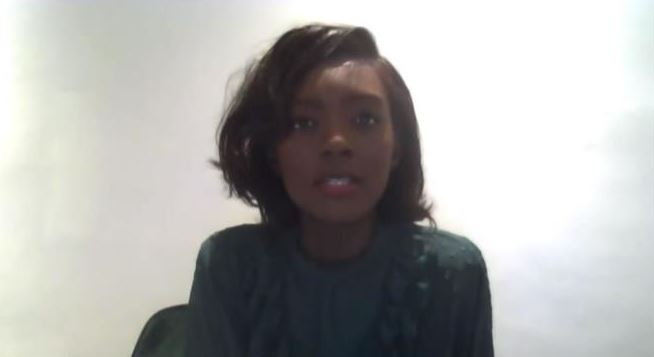
The policy toward Iran seems to be at a standstill. We know the violations that the regime has committed.
We need to have more liberty and freedom. Iranians are tired of this regime, and they want change. I don’t believe that the international community is so blind and naïve. We all know the reality of Iran. We also know your program and what you want for the future of Iran. You are a model for the future of Iran, for democracy.
The international community doesn’t want to see the reality and decided to go along with the regime. This agreement will not reach anywhere, and we are aware of this.
Amb. Lincoln Bloomfield, Assistant Secretary of State for Political-Military Affairs of the U.S. (2001-2005)
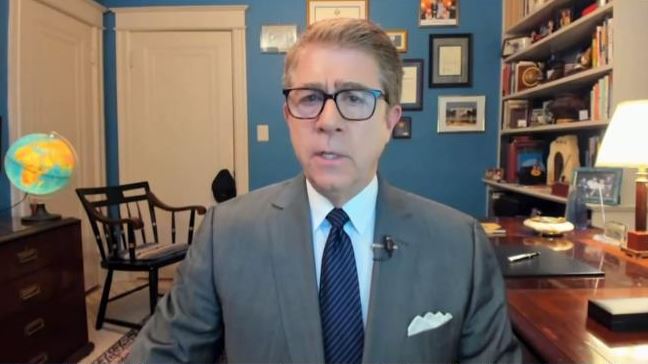
Madame Rajavi, members of the National Council of resistance of Iran, Iranian citizens in Iran, and diaspora members around the world, friends and supporters, it is my honor to be with you today. Greetings.
For most of the past 68 years, America has regretted that the CIA drove Prime Minister Mohammad Mosaddegh from office in 1953. The Shah became a brutal and corrupt dictator, cynically promoting his peacock throne as the embodiment of glorious Persian history. Today in 2021, with Ebrahim Raisi set to become Iran’s next president, no one disputes that Iran’s people are victims of another brutal and corrupt dictatorship. This time cynically promoting the Supreme Leader as the embodiment of religious and political authority. Raisi’s background is impossible to whitewash. Since the age of 20, he has been condemning free thinking citizens to prison, torture, and death with no due process.
In recent years, he ran Mashdad’s Astan Quds‘ conglomerate, a massive enterprise benefiting the clerics, estimates of funds under the Supreme Leader’s control run as high as $200 billion money that should be helping the Iranian people. Imagine what masa Dec would say. The question today, for my country and others, is similar to the one faced in 1953. Will you support corrupt dictatorship? Or will you respect the people of Iran in their demand for legitimate self-government? Today, their rights are being denied and the nation’s wealth is being diverted from their basic needs.
Many outsiders including journalists might be surprised to learn that the NCRI and MEK are the true followers of Mosaddegh’s nationalist democratic ideal. Newspapers often call the resistance Marxist, which of course is false. But in 1981, Ayatollah Khomeini hosted teams of Soviet KGB agents in Tehran to help him suppress dissent and maintain control.
No one in the resistance has ever been convicted of terrorism. Every MEK member in Iraq was vetted by the US government in 2003 and none had any ties to terrorism. Four major court cases in North America and Europe concluded that the MEK never engaged in terrorism. But this year, an Iranian diplomat in Europe received a 20-year sentence from a Belgian court for attempting to bomb the free Iran gathering in France in 2018.
It is time for the world to get its basic facts straight on who is and who is not a terrorist. 40 years of regime deception, propaganda, and disinformation are dissolving as the walls close in on the embattled regime in Theran. My government tried for years to persuade Iran to reform its behavior and improve relations after they bombed our embassy and Marine barracks in Lebanon in the 1980s.
We sent Iran weapons to fight against Saddam Hussein. Yet they continued taking hostages in Beirut. After they bombed Khobar Towers in Saudi Arabia in the 1990s, killing 19 US Airmen, the US placed the MEK on the terrorism list as a political gesture to the reformist President Khatami, yet our reward was a secret nuclear weapons program.
And in this past decade after we agreed to the nuclear JCPOA, ended the arms embargo, released frozen funds and lifted the UN prohibition on ballistic missile development, the regime’s response was to escalate sectarian war across the Middle East. Most of the world is united in seeking to help Iraq recover from war, implement a UN mandated transition to a legitimate government in Syria, address Lebanon’s deepening crisis, promote Israeli Palestinian peace and stop the devastating conflict in Yemen. And yet, in every one of these crisis areas, the obstacle to progress is Iran and its proxy militias.
So, now comes Ebrahim Raisi, a man personally implicated in one of the worst crimes against humanity since World War II, the massacre of an estimated 30,000 political prisoners in 1988. His elevation through a stage electoral charade obliges all of us, our governments and our news media correspondents to face the truth and to speak the truth.
There will never be peace, warmer relations or robust trade with Iran under this regime. Fundamentalist Iran has entered its fifth decade as a blight on the rules based international order. Our shared values and principles are daily being violated openly and with impunity. The situation is intolerable. We must promote change.
My friends, we have told the truth and supported the right principles in Iran for years now, even when much of the world had a different understanding. We were right then, and we are right today. We can’t turn the clock back to 1953. But in many ways, this is another Mosaddegh moment. His goal of a democratic Iran benefiting from the wealth of the nation has never died. It lives within the walls of Ashraf 3. Let us stand together. Say no to tyranny and corruption and yes to a free Iran. Thank you.
Theresa Payton, Chief Information Officer of the White House (2006-2008)
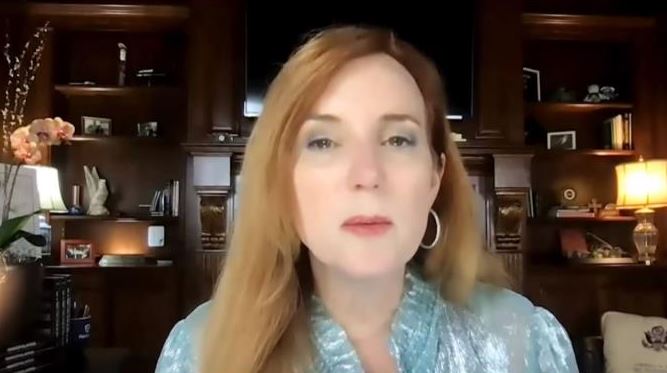
Thank you for having me here, Today. I am honored to be a part of your agenda. First of all, let me start off by saying I pray for freedom for the people of Iran. It is my sincerest hope that you may one day achieve a democratic republic, where gender equality thrives.
The regime has allocated a large number of people to influence pages on most spaces across the internet. The government masterfully leverages platforms such as Wikipedia, fake accounts on social media, and conducts sophisticated web based manipulation campaigns to suppress the people of Iran. Additionally, we also know from a New York Times report that Iranian hackers hacked into encrypted apps of Iranian citizens, media personalities, and journalists.
The evidence indicates the hackers use this access to gather intelligence across multiple people that are a part of the opposition. The Iranian government’s playbook is not only a danger for the people of Iran, but all democracies around the world. As Ars Technica reports, the US government recently saw 33 websites run by a branch of the Iranian government. These websites spread disinformation in the United States, leading up to and including during the 2020 presidential election.
As part of the seizure, the United States Department of Justice said those 33 sites were used by the Iranian Islamic Radio and Television Union (IRTVU) and affiliated with the IRGCQF. The Atlantic Council reports that Iran operates an extremely vast and effective operation. And FRI, that found the complicated web of deception, all the way back into August 2018. The operations targeted various nations, and any Iranian that opposes the current government regime. The Atlantic Council published an inventory of known influences. This propaganda and manipulation campaign includes Facebook, Instagram, Twitter, Reddit, and more. They also reported that in 2011, that’s 10 years ago, the head of the IRIB claimed he had trained at that point a decade ago cyber battalions have over 8,400 people, including what he referred to as media experts and specialists.
Also, According to Amnesty International, the Iran regime has blocked independent reporting on COVID-19 and the handling of COVID 19 pandemic preparation, vaccination, and the emergency around illnesses and deaths. If the Ministry of Culture and Islamic Guidance did not agree with the media report, they gave that news source a very stern warning. The checkpoint research organization has also confirmed findings that Iranian entities loosely affiliated with the Iran government have targeted Iranian expats and dissidents and many groups like the MEK. They found windows attacks that allowed operatives to steal documents and access telegram accounts. They also found an Android malware that extracted two factor authentication codes from SMS messages. They also found ongoing evidence of telegram social engineering. The tools and methods were mainly used against opposition and resistance movements. This is our call to action. The world needs to come together and dedicate ourselves to a bold new approach for freedom for the people of Iran.
Step one, we need a comprehensive strategy across all countries that work across governments and the private sector to enable the citizens of Iran to achieve a free and democratic republic of Iran. Step two, we need to ensure that the people of Iran can share in real-time threats that could have an impact on their anti regime protests and their calls for democracy. Step three, we need to continue to provide financial backing, expert advice, traditional media, and social media influence campaigns to support freedom, honesty and transparency for the people of Iran. We must look at the effectiveness of our current diplomatic measures, set up perhaps an international technical threat hunting team that can look for malicious activity from the Iranian regime, aimed at its own people, the people of Iran, and Iranian expats, for the Iranian people.
Here’s what I recommend you do next, to protect yourself, your loved ones, and your freedom movement. Learn and invest in knowledge and use of privacy and anonymity tools. Make sure you are using only the best virtual private networks, encryption, different types of browsers such as the Tor Browser. If you see that there are extreme or complete blackouts of access to the internet, think about having in place peer to peer networks and devices, you can take a look at systems such as Lantern, and fire chat, they may be of assistance to those inside Iran. Make sure that you always practice safe surfing and when we do the overall future for the people of Iran and the world will take a more positive and different course.
Thank you for having me. I am honored to share these insights, advice, and ideas with you. To the people of Iran. I wish that you would be healthy, be safe, be well. Please follow my advice for safer, more private, and secure internet actions as you work on achieving a true free country.
Ms. Zinat Hashemi, Member of the National Council of Resistance of Iran
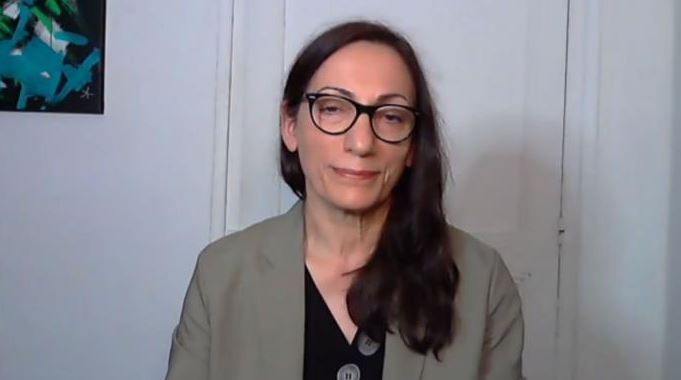
The boiling anger of the Iranian people is the result of what the regime has done in the past four decades. It is reaping what it has sown. It has sacrificed everything the people had for its own survival. But it couldn’t destroy the people’s hope for change and a better future. Today, the resistance has roots everywhere across Iran. This resistance represents the future of Iran.
Kak Babasheikh Hosseini, Secretary-General of the Iranian Kurdistan’s Khebat Organization
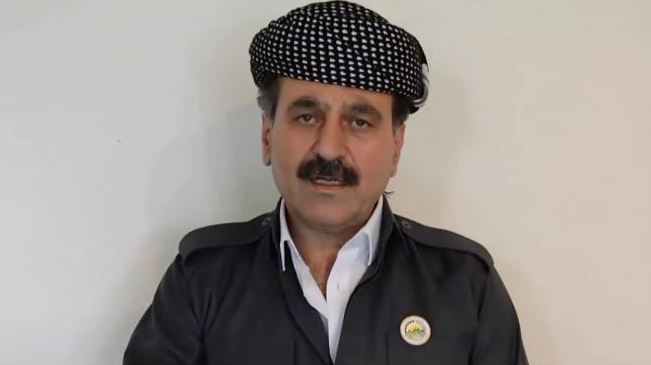
The regime is oppressing the Kurdish people. It is the enemy of all the people of Iran. This regime is anti-human. It has based its power on suppression and brutality. The ruling clerics put up a sham election every four years to try to present themselves as legitimate. This year, the result was clear from the beginning. Raisi, the regime’s new president, is responsible for the 1988 massacre of political prisoners. This election shows the regime has no legitimacy.
Klajda Gjosha, Albanian Minister of European Integration (2013-2017)
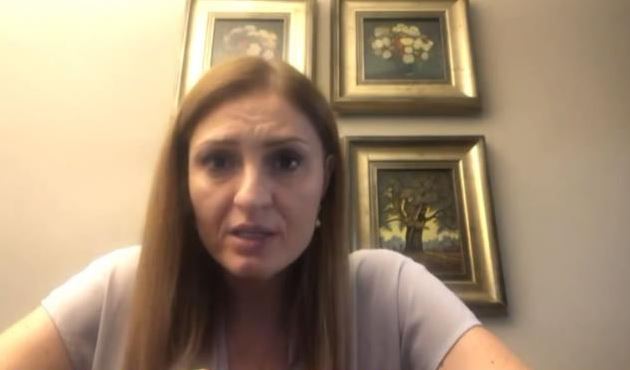
I am very proud that Albania has become a shelter for the Iranian opposition and for the people that have suffered and have stood up to the regime that has captured the state of Iran. They are great alternative. We are supporting them here in Albania. What is happening in Iran is absolutely unacceptable and for the international community this should be more cautious and all of us should turn our attention towards the people of Iran.
Senator Michal Kaminski, Deputy Speaker of the Polish Senate
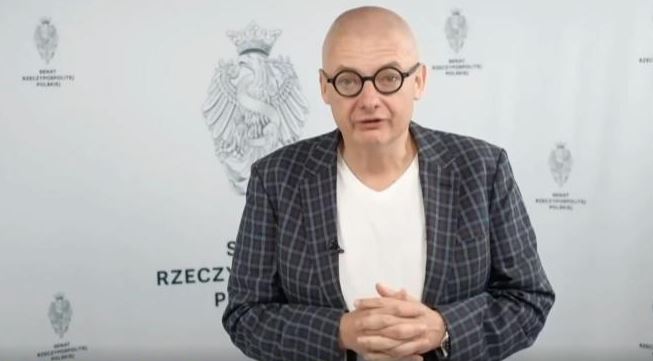
It is very important to notice that in recent times the Iranian regime is becoming more and more aggressive. But it is also important to note that this aggressiveness is not out of strength. This aggressiveness is rather a signal of weakness of the regime because the people in Iran are really disappointed with the policies of Iranian regime. This government is not able to represent the very basic interests of its own people.
I think it is very important from the international community to express our willingness to fully investigate this cruel crime which was committed by Iranian regimes officers in 1988. It is important because we cannot move forward without prosecuting the people who are responsible for such crimes.
Frances Townsend, Homeland Security Advisor to the U.S. President (2004-2007)
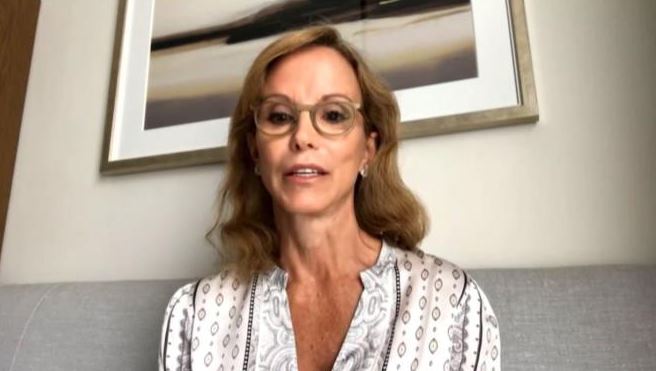
Hello, and thank you for the invitation to join you again today, this time virtually. I care deeply about supporting brave patriots just as you who continue to fight for a democratic Iran despite the threats that come from the thugs who control around today.
I remain committed to speaking out in support of a free and democratic Iran since leaving the White House. The current regime has no interest in meaningful reform, which would, by necessity, remove them from power. While the world engages with Iran on its nuclear weapons program, the many other malign activities of the regime must not be ignored.
Since the 2015, signing of the Joint Comprehensive Plan of Action, the Iranian regime took the millions of dollars released to them and stepped up its terror activities within the region and around the world, launching cyberattacks against Saudi Arabia, providing military funds and support to the Houthis in Yemen, and of course, targeting their opponents both inside and outside of Iran.
In 2018, the regime launched a well-planned, well-funded, but thankfully poorly executed attack just outside one of our rallies in Paris, which was led by Mrs. Rajavi. It was attended by a long list of international dignitaries, many of whom you will hear from today. This brazen attempt to intimidate and coerce the opposition has only made us stronger and more resolute.
Shortly after President Biden’s inauguration this year, those responsible were sentenced to heavy prison terms, the regime allowing the main terrorists responsible for the plot to travel to Europe on a diplomatic passport is only one important fact tying the Iranian regime to the attempted bombing of that rally, attended by 1000s. Even the JC even signing the JCP away seems to have had no impact on the regime’s terrorist activities.
The guilty verdict in this case was vehemently opposed by Ron’s leadership, yet Rouhani alluded to terrorist operations such as this one as having the prior approval of the regime. He said, and I quote, “All the complex issues of foreign policy and the field of defense are discussed in the supreme National Security Council, whether we want to carry out a defensive operation, and whether we have to carry out an offensive operation somewhere, or whether we want to undertake an important political task. They will definitely be discussed in the NSSC.”
The conviction of Asadollah Asadi along with his three accomplices will greatly influence the counterterrorism efforts across Europe in the future. Asadi was unable to maintain his diplomatic immunity as a defense strategy, and his cohorts were stripped of their dual Iranian Belgian citizenship. Bahram Ghassemi, a spokesman for the Iranian Foreign Ministry, continues to push the narrative that this was for the ‘stage conspiracy’ to sever relationships between Europe and Iran, and that these four men were victims of a larger political scheme.
There was a continued effort to hold the Islamic Republic of Iran accountable for these acts of terrorism. We should remain hopeful that for future legislation allowing EU states to stoop to sue a state for terrorism and financial compensation for its victims. Iran is still lobbying to reverse the sanctions put in place, and it could be closer than we think. As recently as Friday, the US Treasury removed three Iranian nationals from its list of individuals who are subject to certain US sanctions. An anonymous Treasury spokesman said, “These delistings do not reflect any change in US government sanctions policy towards Iran. They have nothing to do with the ongoing JCPOA negotiations in Vienna.”
The economic consequences of sanctions continue to be a motivating factor pushing the regime back to the negotiating table, and now there is no time to back off what has been an enormously effective sanctions program. The sham election of Ebrahim Raisi is a reminder to the governments in Europe and the United States that making concessions to this regime under any pretext would be counterproductive.
Raisi is a serial human rights violator of basic human rights, who should be put on trial and investigated for his horrendous crimes against humanity and not handpicked by the theocracy to lead Iran. He was a member of the death committee in 1988, which sent thousands of political prisoners, especially from the MEK to their execution. In his first press conference after the sham election, he defended his role in that mass killing, saying that he should be rewarded for it because it was in defense of the Iranian people and national security. Nothing could be further from the truth. He is also responsible for the illegal arrest and torture of thousands of protesters in Iran during the demonstrations of 2019. Raisi stands with his conviction that his actions are in protection of human rights of his people, and not crimes against the Iranian people.
The United States sanctioned Raisi in 2019 for his role in these human rights violations, but it remains difficult to hold him to any basic standard. Amnesty International Secretary General, Agnes Callamard remains committed to hold Raisi liable for his crimes, but also to expose this election for what it really was, yet another crime against the human rights and democracy of Iran. She said, Ebraham Raisi‘s rise to the presidency follows an electoral process that was conducted in a highly repressive environment, which barred women, members of religious minorities and candidates with opposing views from running for office.
The desire for democracy in Iran is not a fleeting dream among disconnected individuals across the Iranian nation. There is a deep-rooted network of resistance that remains organized and committed to change. We always have a choice when negotiating with foreign nations, and acceptance of the Iranian regimes is not a foregone conclusion. The United States along with the rest of the world does not have to yield to Iran becoming a nuclear state, and should not respond to the use of terrorism as a political tool.
Mrs. Rajavi’s 10-point plan for the future of Iran continues to be a solid framework for a future democratic republic. There is a viable alternative to the current situation, and we must not forget that. Mrs. Rajavi remained resolute in her defiance of the regime and her commitment to democratic principles, including, among others, the freedom of speech, the equality of women, and ensuring a non-nuclear Iran.
I will never walk away from a fight I know we can win, and I will stand with the MEK, the NCRI and the continued effort to uphold human rights in Iran and around the world. It is both imperative and our responsibility to speak up for those in Iran who cannot because they have been silenced by the regime.
We must remain committed, strong, persistent and tenacious to reach our ultimate goal of a free and democratic Iran, where a rally such as this can be held. I am proud to play a small part in this endeavor and will remain with you until we can see that day. Thank you.
General James Conway, 34th Commandant of the U.S. Marine Corps
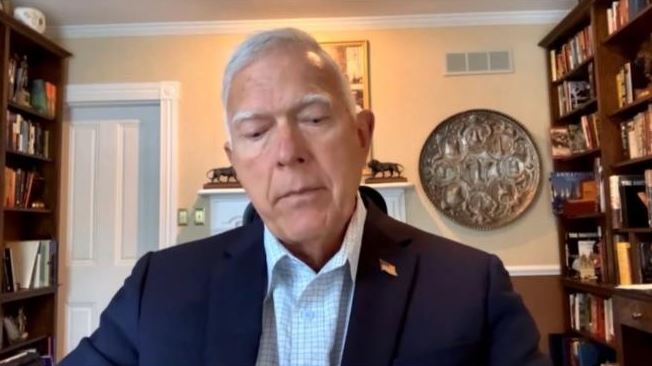
Even after the death of Soleimani Iran has continued to play a role as the pariah of the Middle East.
Another hardliner was elected as president of Iran, this one with even more blood on his hands than his predecessor. His unfortunate election should send a strong message to any who hoped that a more moderate government might come to power.
You have the leadership in place to guide you through to success. Leadership is about inspiring goals to follow about making correct and timely decisions.
General Jack Keane, Vice Chief of Staff of the U.S. Army (1999-2003)
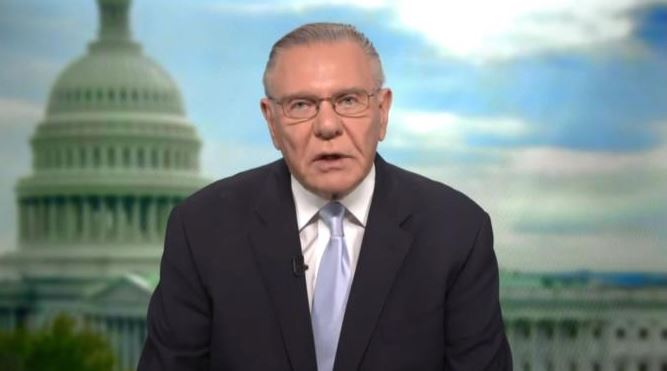
I have joined my American colleagues in fully supporting your resistance movement, your drive for a free Iran, and your willingness under the leadership of Maryam Rajavi to inspire the people of Iran and the people around the world by vividly bringing to the world’s attention the struggle of the Iranian people for their freedom.
In another sham Iranian election, the supreme leader selects the candidates who can run in the election and also preselects the winner. Now Ebrahim Raisi, a mass murderer condemned internationally for killing and imprisoning his own people, is selected. Iran has removed the phony pretense of appointing a president willing to collaborate with the international community and improve life at home for the Iranian people.
We are entering a very dangerous and precarious time as the Biden administration is pursuing a policy of appeasement and fully intends to renew the original nuclear deal of 2015.
The Biden administration and their European allies refused to accept the truth that Iran will pursue a nuclear weapon in secret regardless of any deal in order to preserve their regime.
The United States must once and for all abandon the idea of appeasing Iran and that Iran can be trusted.
General Chuck Wald, Deputy Commander of the U.S. European Command (2002-2006)
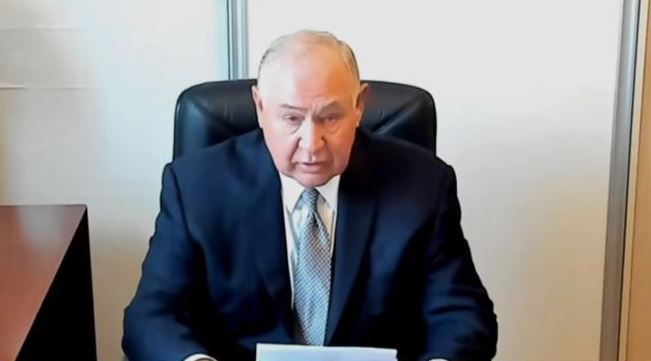
The ascension to presidency of Ebrahim Raisi put an end to the myth of moderation within this regime.
The answer to this regime is not more concessions but a firm stand and a clear message to Tehran that this time around there will be a more comprehensive sanctions by the international community.
The regime only understands the language of strength and nothing else.
Mario Díaz-Balart, U.S. congressman
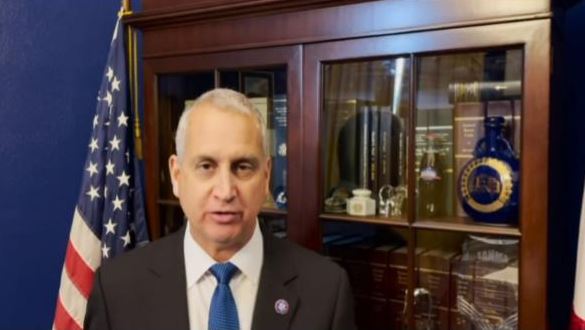
To all of you that continue to fight for the freedom of Iran, please know that there are so many of us that are with you. We stand united in the cause of a free Iran, in the cause of the elimination of that terrorist regime that has repressed and oppressed the Iranian people. For decades, Iran will be free because of your efforts. Iran will be free, because the Iranian people are demanding freedom. And this terrorist play that has hurt and destroyed so much and so many for such a long time will forever be in the heat of trash, and will be remembered as one of the darkest moments, not only in the history of Iran, but in the history of this planet. Thank you for your activism. Thank you for not tiring. We are with you. And victory and freedom will arrive, we’ll reach Iran sooner than later.
Harry Reid, U.S. Senator (1987-2017)
What we have going on in Iran today is not going to last forever. I look forward to the day when Iran has new leadership, become part of the civilized nations of the world.
Mary Landrieu, Former U.S. Senator
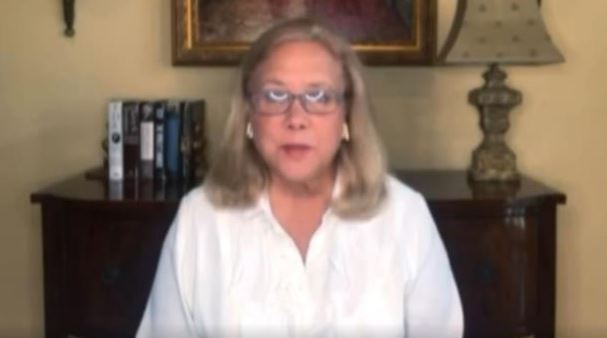
It’s a pleasure for me to join all of you today and lend my voice to your great and noble work to free Iran from oppressive leadership. Your work to get Iran on a stronger, more vibrant, more hopeful path not only will help your country but will help freedom loving people all over the world.
Nathan Sales, Special Envoy to the Global Coalition to Defeat ISIS within the U.S. Department of State (2017-2021)-Under Secretary of State for Civilian Security, Democracy, and Human Rights (2017-2020)
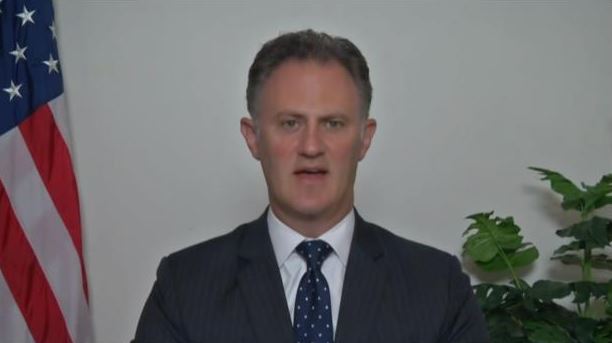
It’s a great pleasure to join you all at this year’s Iran Human Rights and Democracy Conference. I’d like to thank the tens of thousands of people who are joining us virtually today from all around the world.
Most importantly, I’d like to thank the Iranian people — those who are watching inside Iran as well as the diaspora here in America and across the globe. For more than 40 years, you’ve stood up for democracy and liberty, confident that a better day is coming. Your example is an inspiration to all freedom loving peoples around the world.
I’m here today to talk about terrorism – the Iranian regime’s use of it, and what we can do about that.
Make no mistake: The Islamic Republic of Iran is the world’s worst state sponsor of terrorism. Acting through the Revolutionary Guard Corps and countless terrorist proxies, the regime has murdered innocent civilians, taken countless hostages, and shed blood on a hideous scale, not just in the Middle East but around the world.
Why? Because ultimately, the Islamic Republic is a theocratic regime. It seeks to consolidate and export its ideaology, and terrorism is one of its main tools for doing so. If you think you’re on a divine mission, then laws against murder and extortion don’t apply to you.
Let’s take a brief tour.
In Lebanon, Iran has spent decades lavishly bankrolling the terrorist group Hizballah, building a corrupt state within a state that serves Tehran’s interests and impoverishes the Lebanese people.
And when Hizballah is not busy destroying Lebanon, its fighters are hard at work across the border propping up the brutal Assad dictatorship in Syria, greatly adding to the misery of the long-suffering Syrian people.
Hizballah is also the Iranian regime’s most dangerous terrorist proxy, plotting deadly attacks in such far-flung places as Argentina, Bulgaria, and Cyprus. In the past few years, it has been caught stockpiling explosives in Western Europe, in the Gulf, in Southeast Asia, and elsewhere.
The regime must be proud of what it’s done to Lebanon, because it’s doing the same thing to other countries, building terrorist proxies that enforce Tehran’s will from the barrel of a gun.
In Iraq, Iran-backed militias brazenly massacre peaceful protesters and assassinate public figures.
They also subject American soldiers and diplomats to a constant barrage of rocket fire. And now we’re seeing reports that the regime has handed these militias sophisticated drones capable of evading defenses.
This all comes after Tehran gave terrorists advanced munitions that killed more than 600 American troops during the war.
In Yemen, the Iranian regime provides the Houthis with weapons they use to attack airports, energy infrastructure, and other civilian targets across the region while bringing the Yemeni people to the brink of famine.
Last December, the Houthis attempted a decapitation strike on the Yemeni government as its senior leadership arrived at Aden airport. They missed, but they did kill 22 innocent bystanders – including three humanitarian workers with the International Committee of the Red Cross.
Indeed, the Islamic Republic’s reach extends far beyond the Middle East – as this group well knows.
In Europe, in 2018, an Iranian intelligence agent operating under diplomatic cover orchestrated an elaborate plot to bomb this very event taking place near Paris. This hits home for many people who are watching this here today, as you were yourselves targets of this terrorist plot. Fortunately, this diplomat has now been convicted in a Belgian court and is serving a 20-year prison sentence.
Nor is the United States immune. Since 2017, the FBI has arrested three suspected Hizballah operatives on American soil. Two of them were casing potential targets in New York City, including the Statue of Liberty and Rockefeller Center; another conducted surveillance on the Panama Canal.
But it’s important to remember that the first victims of the Iranian regime’s terrorism are the Iranian people themselves. For decades, the IRGC has looted the Iranian economy, corruptly enriching itself at the people’s expense. The regime’s henchmen gun down peaceful protesters in the streets with impunity. Its torture chambers brutalize ordinary Iranians for exercising their fundamental rights to free speech and assembly.
And now the regime is doubling down on its crimes against humanity. It has used a sham election to install a butcher as president. Ebrahim Raisi, a man whose hands are stained with the blood of thousands of his countrymen.
So what do we do about it?
That’s a big question, but I think that any policy toward the Islamic Republic of Iran has to begin with a simple principle.
First, do no harm.
What that means is, at a minimum, don’t hand the regime resources it will use to support terrorism around the world. Don’t hand the regime resources it will use to further entrench itself and violently suppress those who are calling for change.
We know that terrorism sanctions work. Sanctions deny terrorists the money they need to plot attacks.
Consider Hizballah.
Since 2017, 14 countries have joined the United States in sanctioning or banning Hizballah in its entirety – rejecting the fantasy that the group has a peaceful “political wing” we can do business with.
For years, Hizballah could count on its patrons in Tehran to provide it with upwards of $700 million a year. But after America and our allies turned up the heat, the money dried up. Hizballah’s leader was reduced to going on TV and pleading for donations.
In 2019, the United States sanctioned the IRGC for supporting terrorism. That same year, we sanctioned Ebrahim Raisi for decades of appalling human rights violations, including his role in the 1988 “death commission” that slaughtered thousands of political prisoners.
Remember: The point of sanctions is to change behavior. Until Tehran changes its behavior, those sanctions need to stay in place.
In closing, I want to speak directly to the Iranian people.
There is no quarrel between the United States and the people of Iran. We seek friendship, and we know that you’re not responsible for the crimes committed by your self-appointed “leaders.” The American people will always support you in your pursuit of freedom and democracy.
Because we know that the Iranian people deserve better than the Iranian regime.
The Iranian people deserve a government that’s accountable to them at the ballot box.
They deserve a government that respects human rights and the rule of law.
They deserve a government that doesn’t murder peaceful protesters in broad daylight.
They deserve a government that’s led by statesmen, not criminals.
They deserve a government that’s at peace with its neighbors.
And above all, the Iranian people deserve a government that doesn’t plunder their wealth to support terrorism and bloodshed around the world.
To our Iranian friends, the American people know that your cause is just, and we will always stand with you as you fight to determine your own future. Thank you.
Senator John Boozman
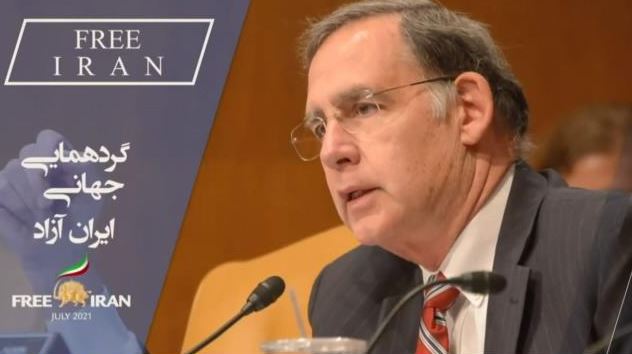
I support the efforts of the Iranian people to bring change and democracy to their country. I am disturbed by the ongoing human rights violations in Iran, and I support the Iranian people in their pursuit for peace.
I also remain committed to preventing Iran from developing a nuclear weapons program. Yours is a noble cause and it is very important that we continue the dialogue on this matter.

